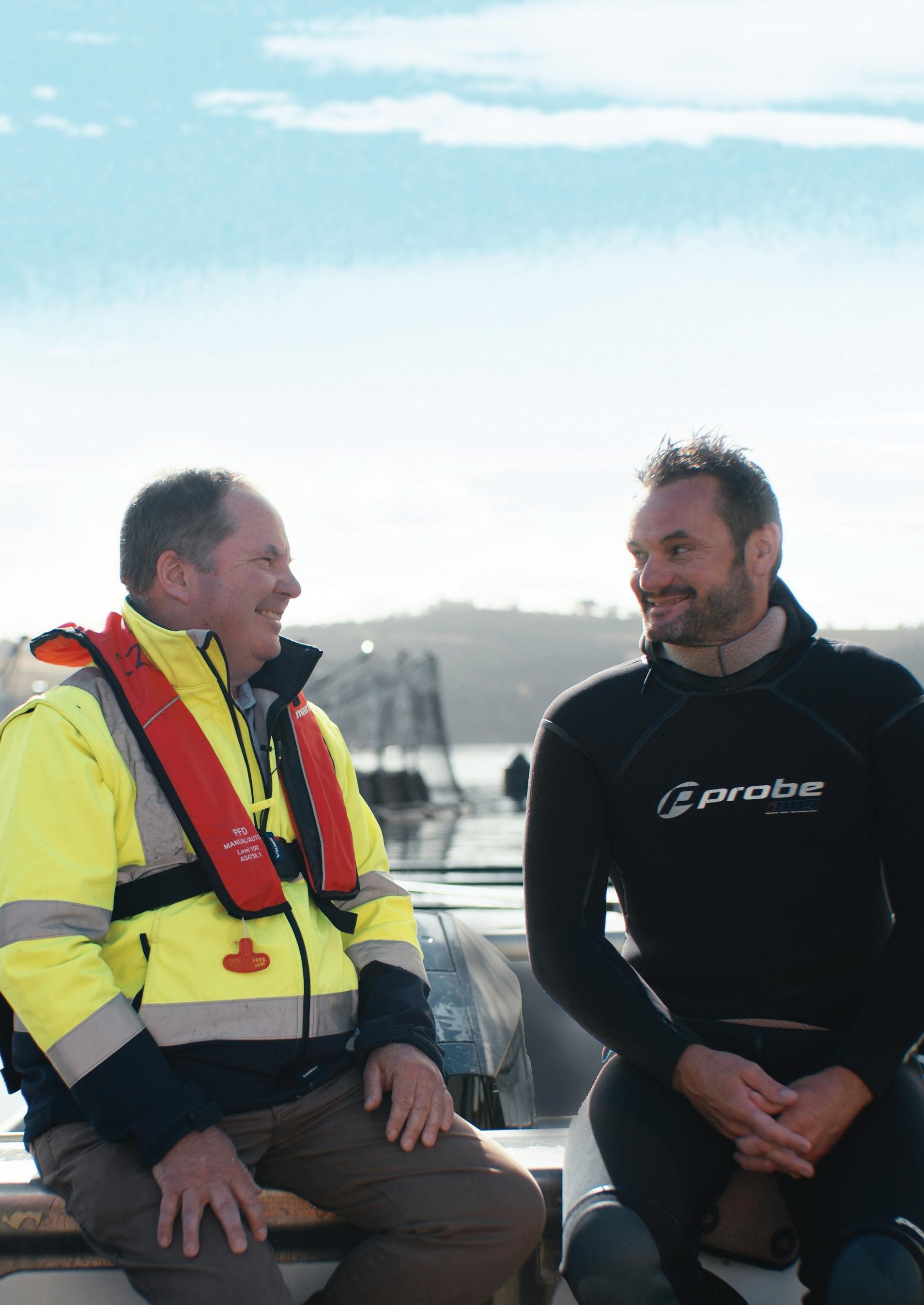
smolt Celebrating our people l our community l our science l our industry Edition 1
Our Snapshots
Have you taken an amazing photo recently?
If so, send it to admin@salmontas.au
If your photo is published you will receive a $50 visa card from Salmon Tasmania.
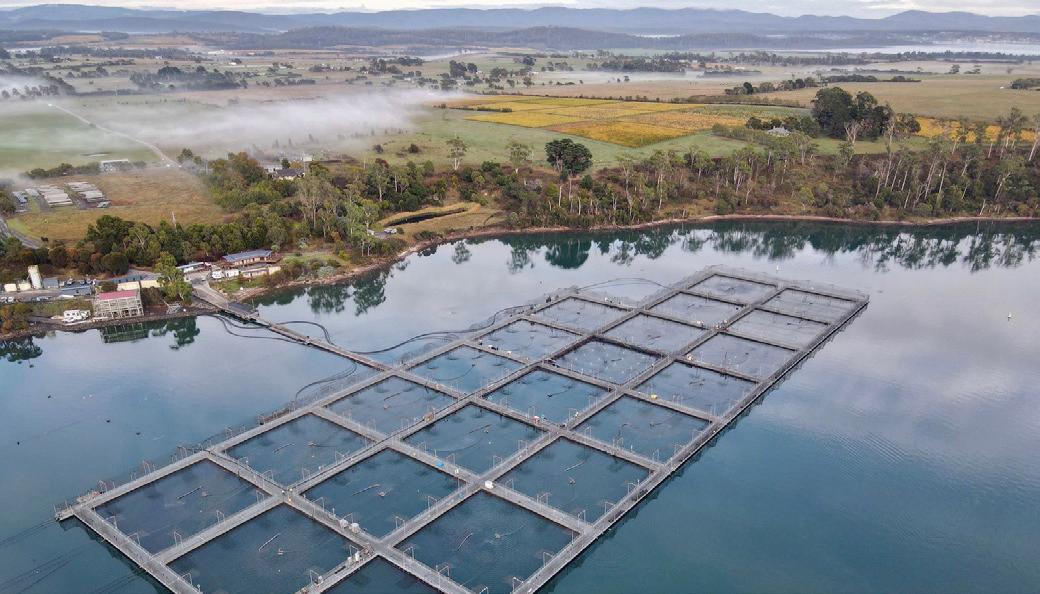
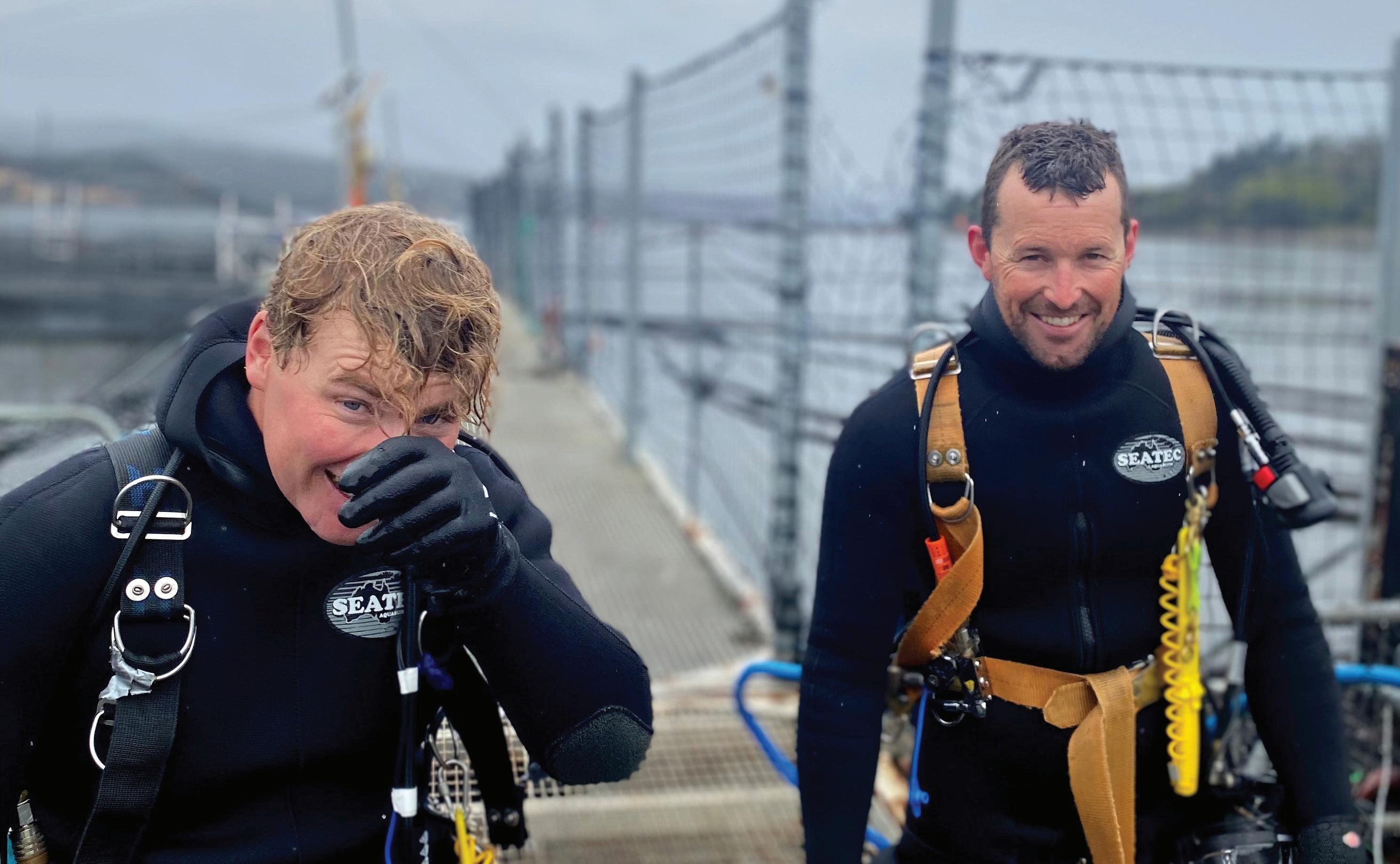
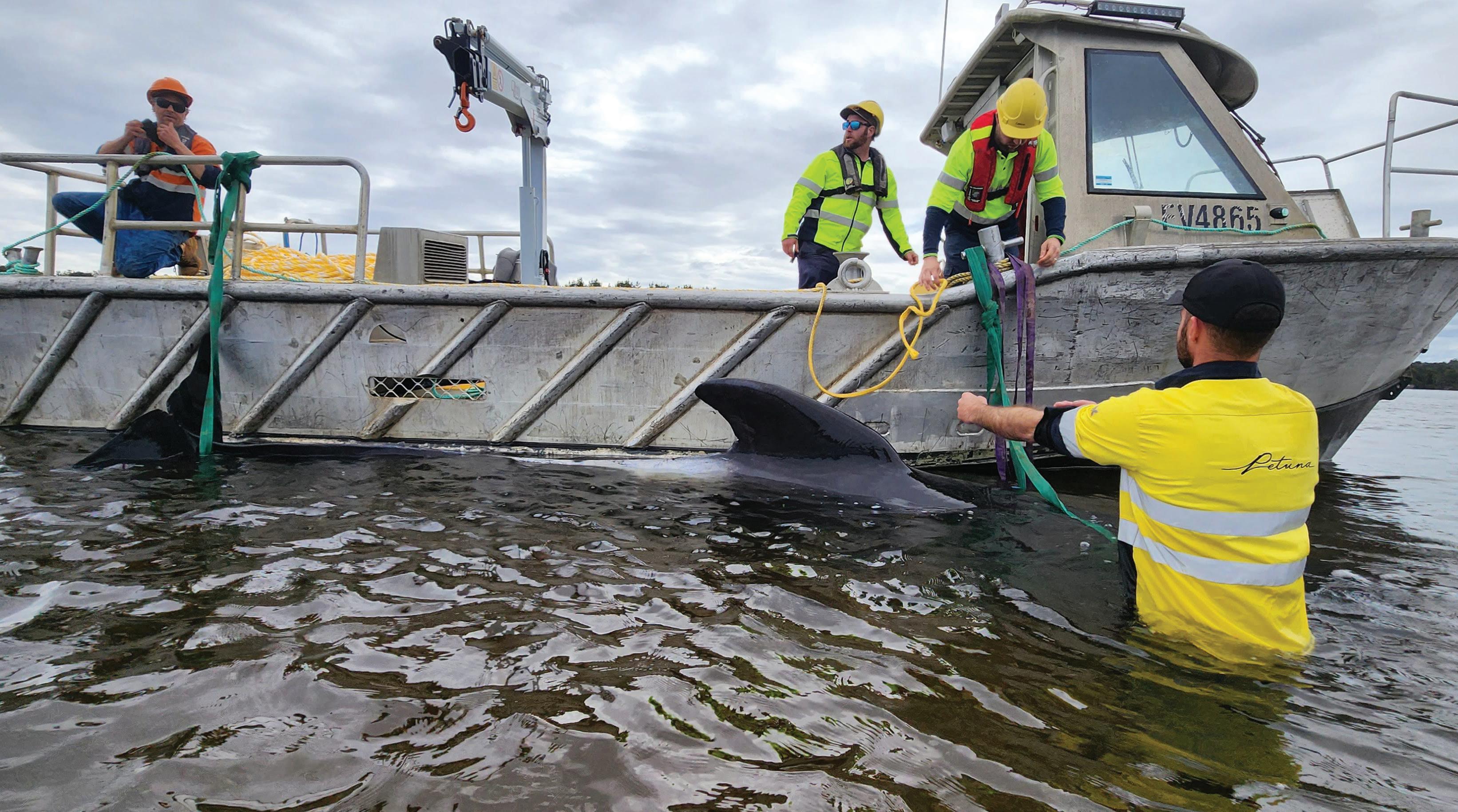 Whale Rescue, Strahan - Daniel Costello
Rowella - Matt Stackhouse
Rowella - Greg McEvoy
Whale Rescue, Strahan - Daniel Costello
Rowella - Matt Stackhouse
Rowella - Greg McEvoy
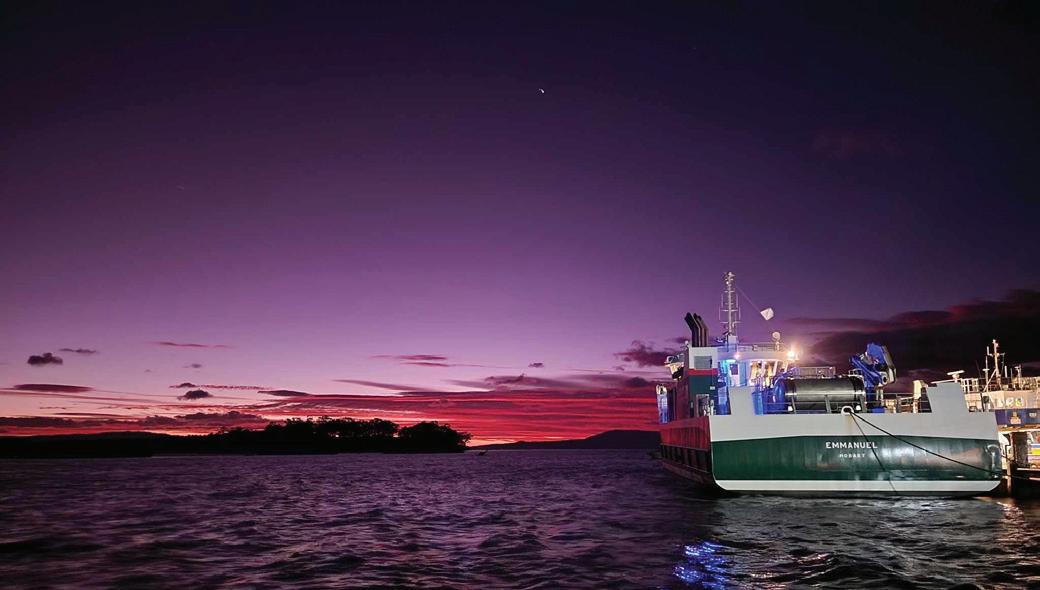
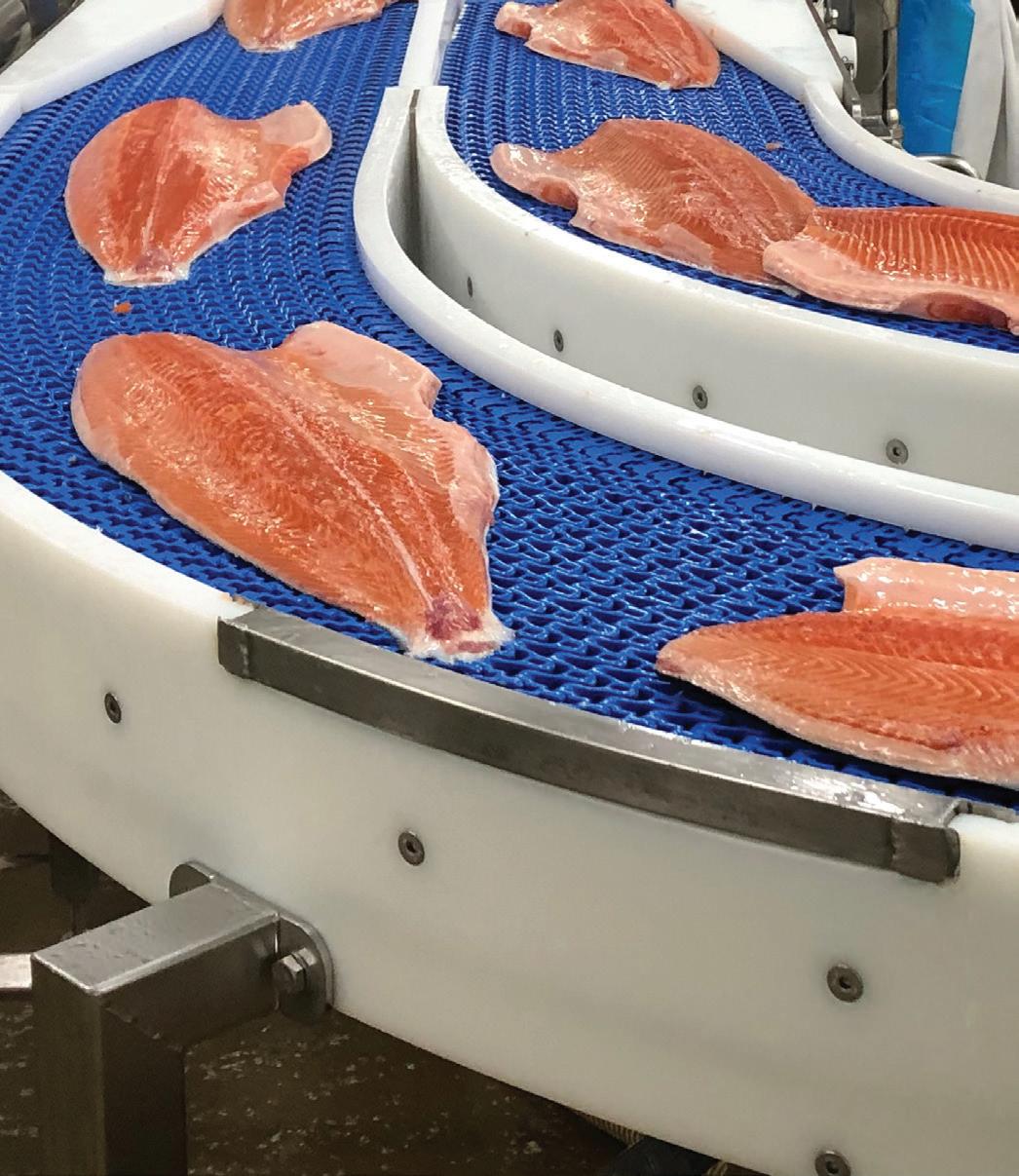
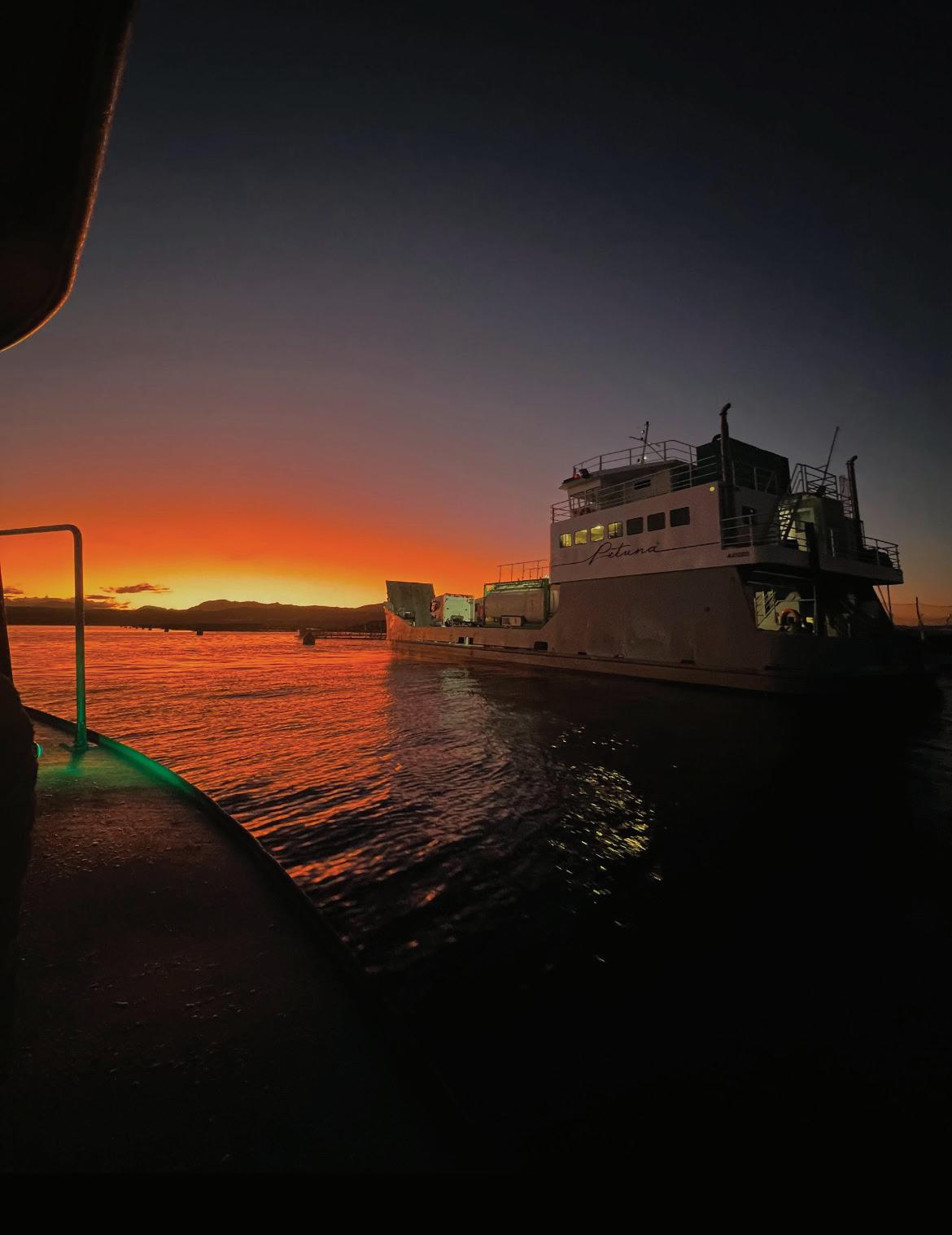
Welcome to Smolt Magazine 4 Our heritage 6 Opinion Luke Martin 8 Celebrating our industry 10 Economic Contribution report 12 Cressy Hatchery announcment 14 Indonesian trade expo 16 Awards and recognition 20 protecting our environment 22 Showcasing our science 24 Supporting our community 27 Celebrating our people 28 Enjoying our product 30 Cover photo: Sean Riley & Matt Barrenger Credit: Matt Scott Published by Salmon Tasmania Contact admin@salmontas.au edition 1
Processing - Adrian Connell
Shane Coleman - Dover
Strahan - Bethany Taylor
Welcome from Salmon Tasmania
Welcome to SMOLT Magazine.

In Tasmania we have a proud history of innovation, self reliance and resilience and our salmon industry is a shining example of who we are as a state. As anyone in the industry will attest, we are proud of our
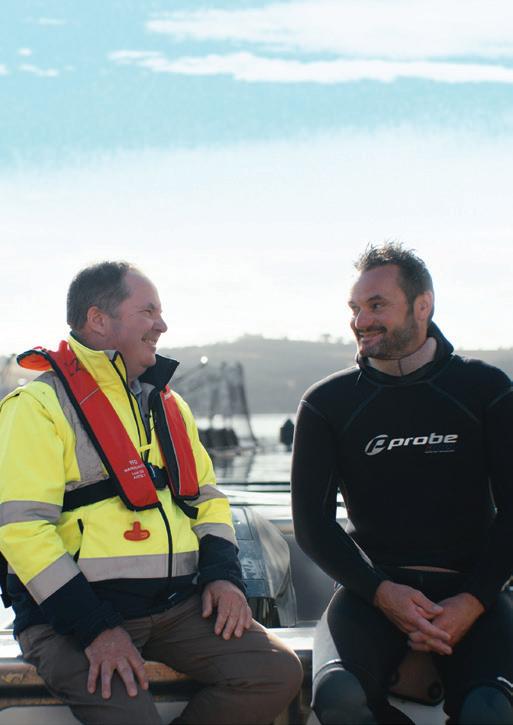
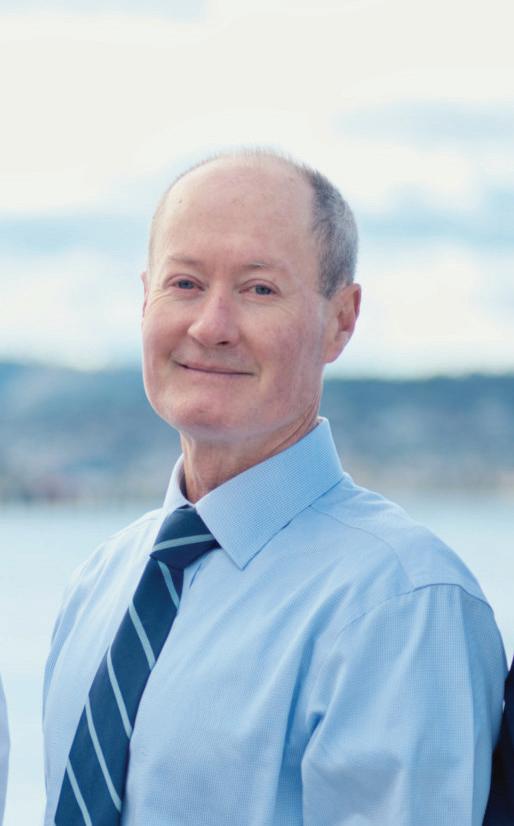
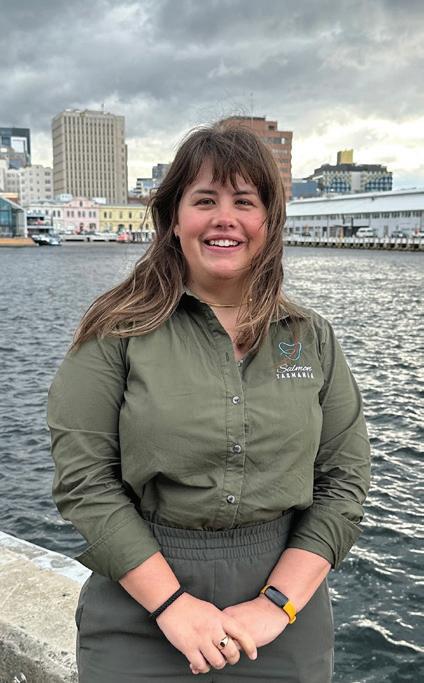
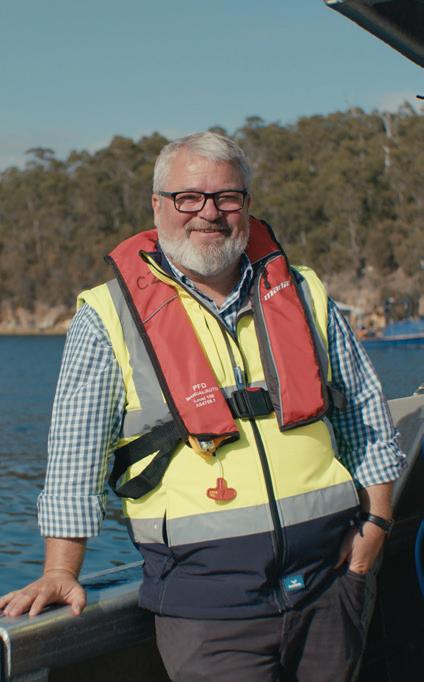

achievements, contribution to the community and care of our shared environment.
We are however, at times, hesitant to share our achievements and culture which is why we are delighted to introduce SMOLT Magazine.
SMOLT will showcase our amazing industry and bring to life the many facets that make our people and our community proud.
Regards, The Salmon Tasmania Team
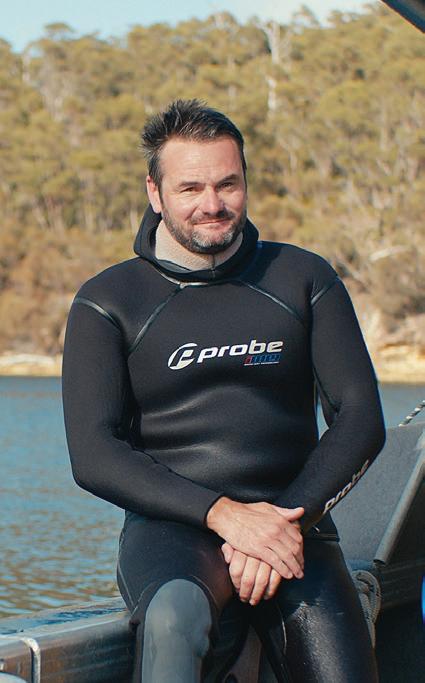
Page 4
Luke Martin Chief Executive Officer
Matt Barrenger Technical Director
Stuart Harris Communications Director
Christine Schwugier Project Officer
Lyall Howard Chair
Subscribe smolt Celebrating ourpeople l ourcommunity l ourscience l ourindustry Edition 1 Make sure you don’t miss future editions of SMOLT Magazine. Subscribe to our mailing list. Scan or click the QR code to subscribe
What an exceptional honour it has been to work alongside your industry over the past year.
Your stories of determination, of defying the odds, of courage and always striving for worldclass standards are what make this industry.
I want all Tasmanians to know how hard you work and what you are achieving each and every day.
It is a credit to the industry that there are so many passionate people across this State who are engaged in, and with, the industry, delivering great outcomes for Tasmania.
What has resonated with me is the sense of pride that shines through, whether it is on the process line, in a feed mill or on a barge, everyone has such a sense of pride in what they do and what they are contributing to, and that is inspiring.
It’s also really important to acknowledge the extent to which industry contributes back into our community. From supporting local sporting teams and school breakfast clubs to providing scholarships through Utas that will inevitably build knowledge and capacity here in Tasmania. These contributions and many more support and strengthen our communities.
So too, the supporting industries like truck operators, the boat builders and scientists have an essential role to play in making our salmon industry the most valuable seafood sector in the nation.

Meeting people who work in this great industry is always such a highlight for me and each time I talk to someone, I always learn something new.
The Rockliff Liberal Government has always been a strong supporter of this industry and we want to see it continue to sustainably produce outstanding Tasmanian Salmon, and maintain its future focus.
Our Tasmanian Salmon Industry Plan has been carefully developed to provide certainty and ensure sustainable outcomes not only for the unique environment that our salmon are grown in, but for your businesses, your jobs and your future.
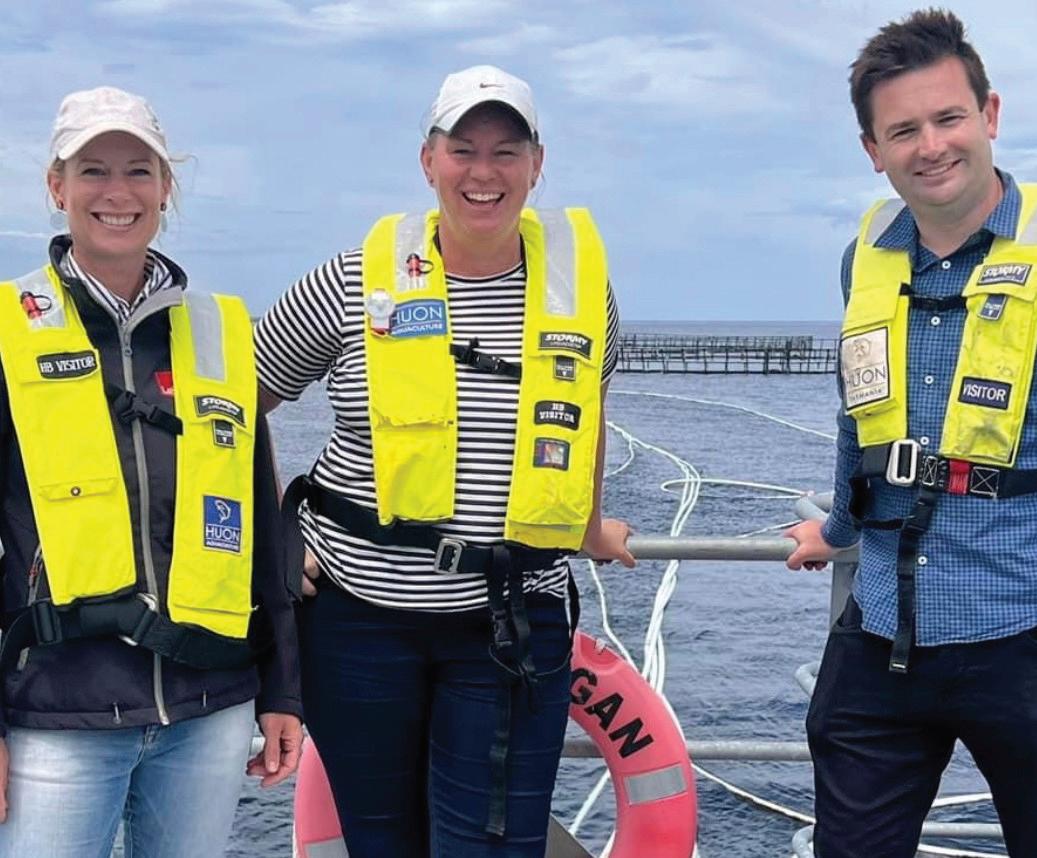
I’d like to thank you for the terrific job your industry has done and continues to do for Tasmania. Well done, keep up the great work and congratulations on the release of SMOLT!
Jo Palmer.
employs. After all, supporting workers is in Labor’s DNA.
The salmon industry’s economic activity supports our rural and regional communities. Labor is committed to ensuring that the jobs and economic prosperity this wonderful industry brings to our regional communities is protected.
Our Tasmanian salmon industry is an exciting place to work. I am constantly amazed and inspired by what is achieved in the sector.
Whether it be working in the hatcheries in the North-East, on a net slab in the south or on the wild waters of Tasmania’s great Storm Bay, every worker has an important role to play.
So many people have worked really hard and made significant sacrifices to have this healthy and delicious low-carbon protein grown right here in Tasmania.
I say thank you.
As the largest primary industry in Tasmania, Labor is proud to stand up for our Tasmanian salmon industry and back in the thousands of Tasmanians it
I love hearing the stories of how our salmon industry is directly supporting local footy clubs and local businesses.
Together, Franklin MP Dean Winter, Braddon MP Shane Broad, Labor Leader Rebecca White, and I have not been shy to voice our support for the sector.
Tasmanian Labor has your back and we’re proud and grateful for the work you do.
Janie Finlay.
Page 5
Jo Palmer MLC
Minister for Primary Industries and Water
Janie Finlay MP
Shadow Minister for Primary Industries & Water
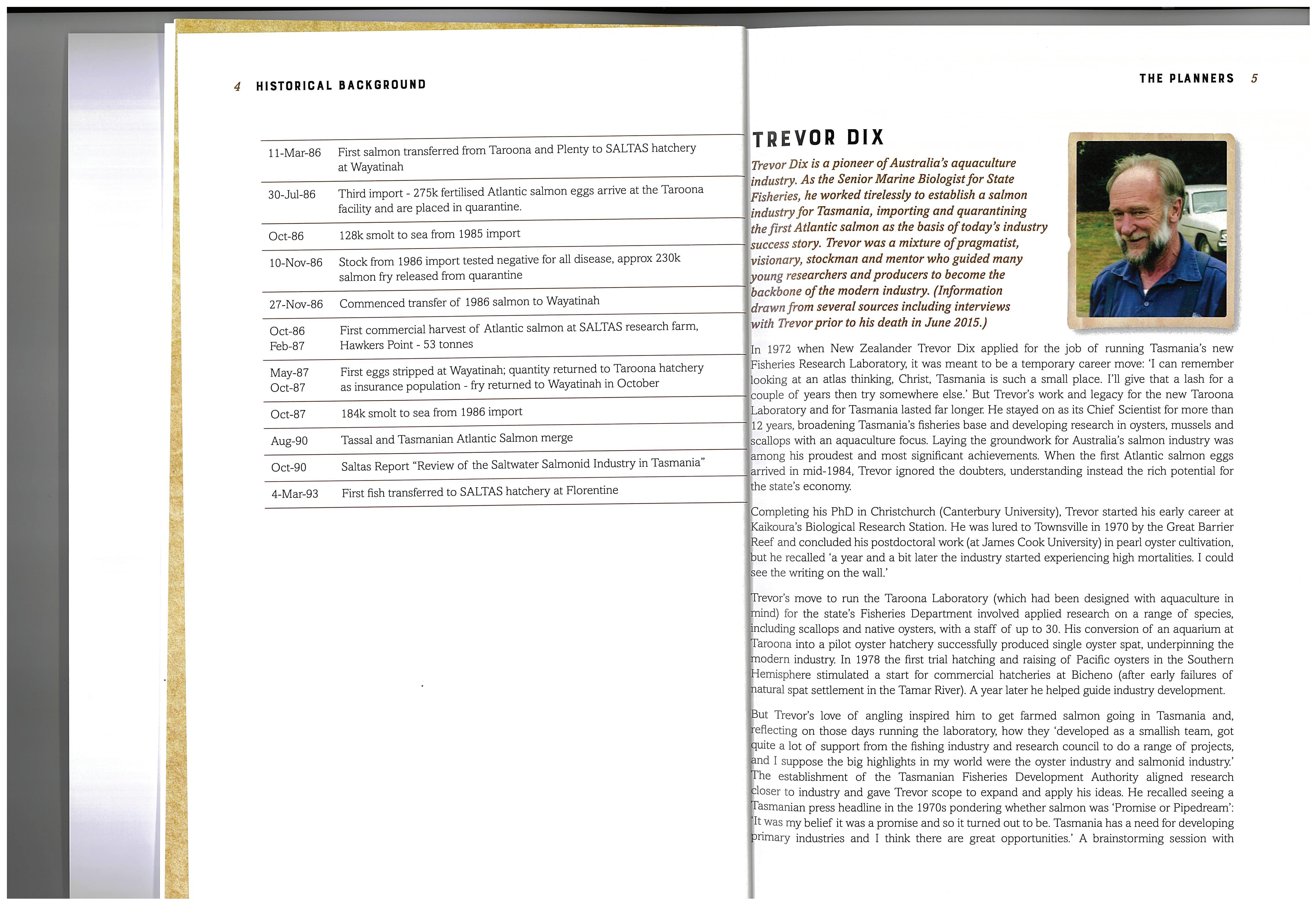
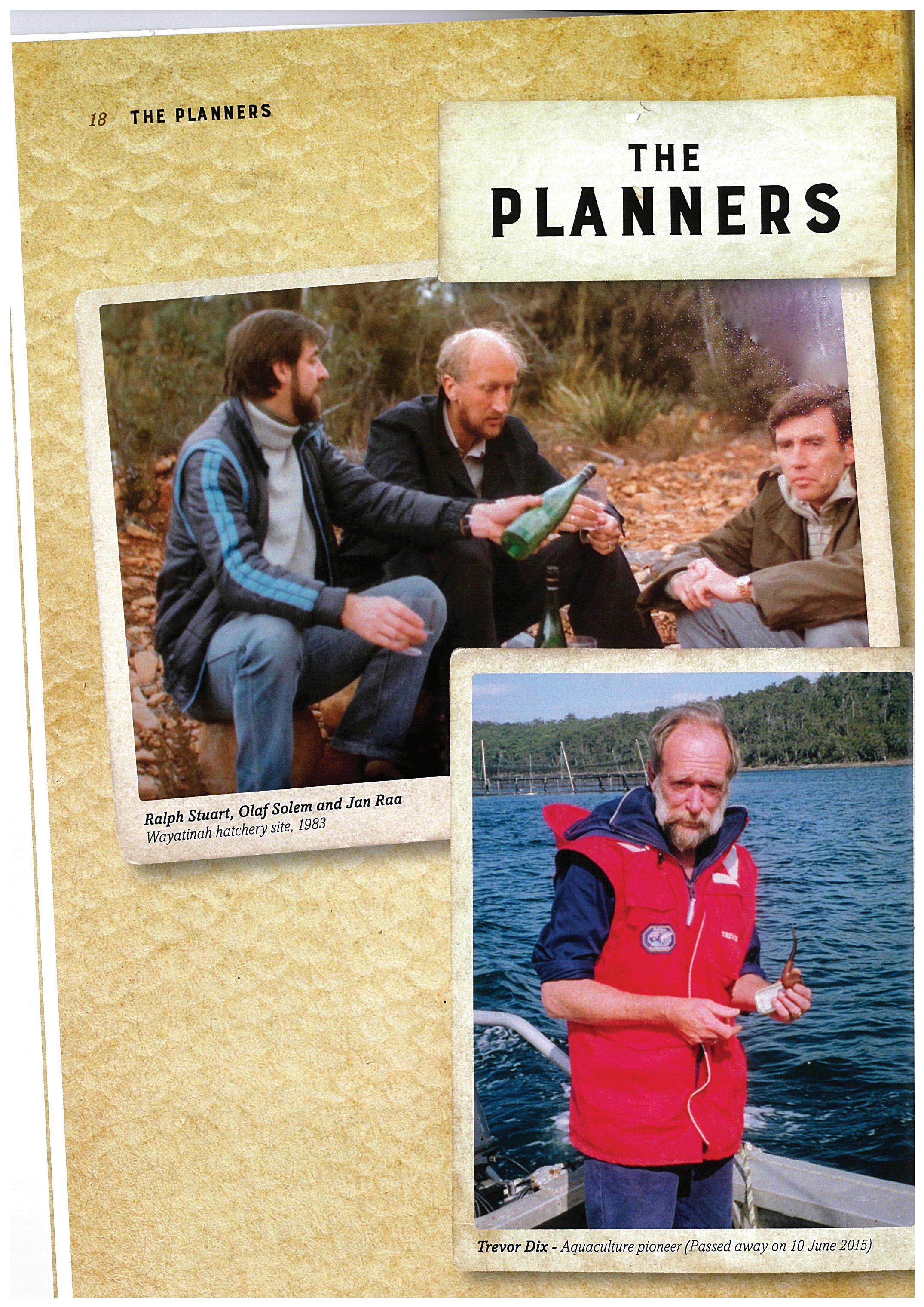
Trevor Dix

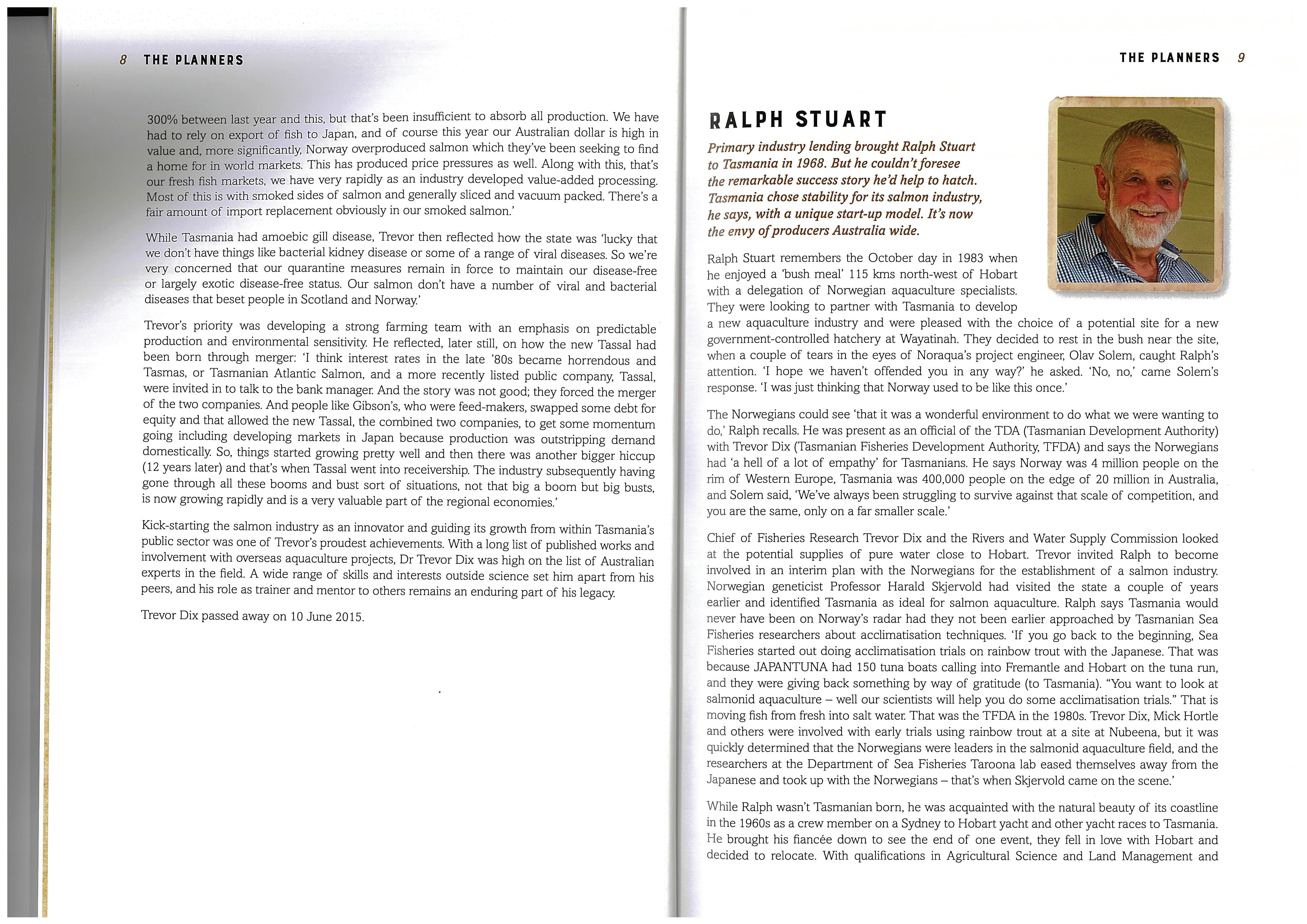
Some have asked why I’ve made the move to the Tasmanian salmon industry.
For the past 12 years, I’ve had the privilege to work for an industry in tourism that is the economic lifeblood of so many regional Tasmanian communities. Now, I have the opportunity to work with another.
What I love most about Tasmania is the unique character of our many regional communities and small towns across the island.
These communities really are the lifeblood of Tasmania with booming tourism businesses, a thriving and diverse agriculture sector, dedicated fishing towns, and of course aquaculture.
I love the fact you can drive a few minutes from one town to
Our salmon industry strengthens our regional communities
Martin,
the next, down the Huon Valley, or along the East Coast, or from Queeny to Strahan on the West Coast, and find a completely different community with different economic activities that build unique relationships, enterprises and livelihoods.
the Tasmanian way of life. It should give every person connected with the salmon industry great pride to see towns bustling with local salmon workers who are going about their lives, getting their lunch from the local take away, having a beer at the local pub after work or getting supplies from the local supermarket, proudly dressed in their company uniforms.
They value and understand the importance of these industries because these are towns full of people who still know what it means to look after one another, and still want the best for their friends and families.
Sustaining the economic prosperity of regional communities is about securing
Recently, Salmon Tasmania released research by Deloitte that found the Tasmanian salmon industry is valued at $1.3 billion per annum and directly contributes $770 million to the Tasmanian economy each year while supporting 5,100 full time equivalent jobs.
This is especially evident in places like the Huon Valley where one in four working people are employed because
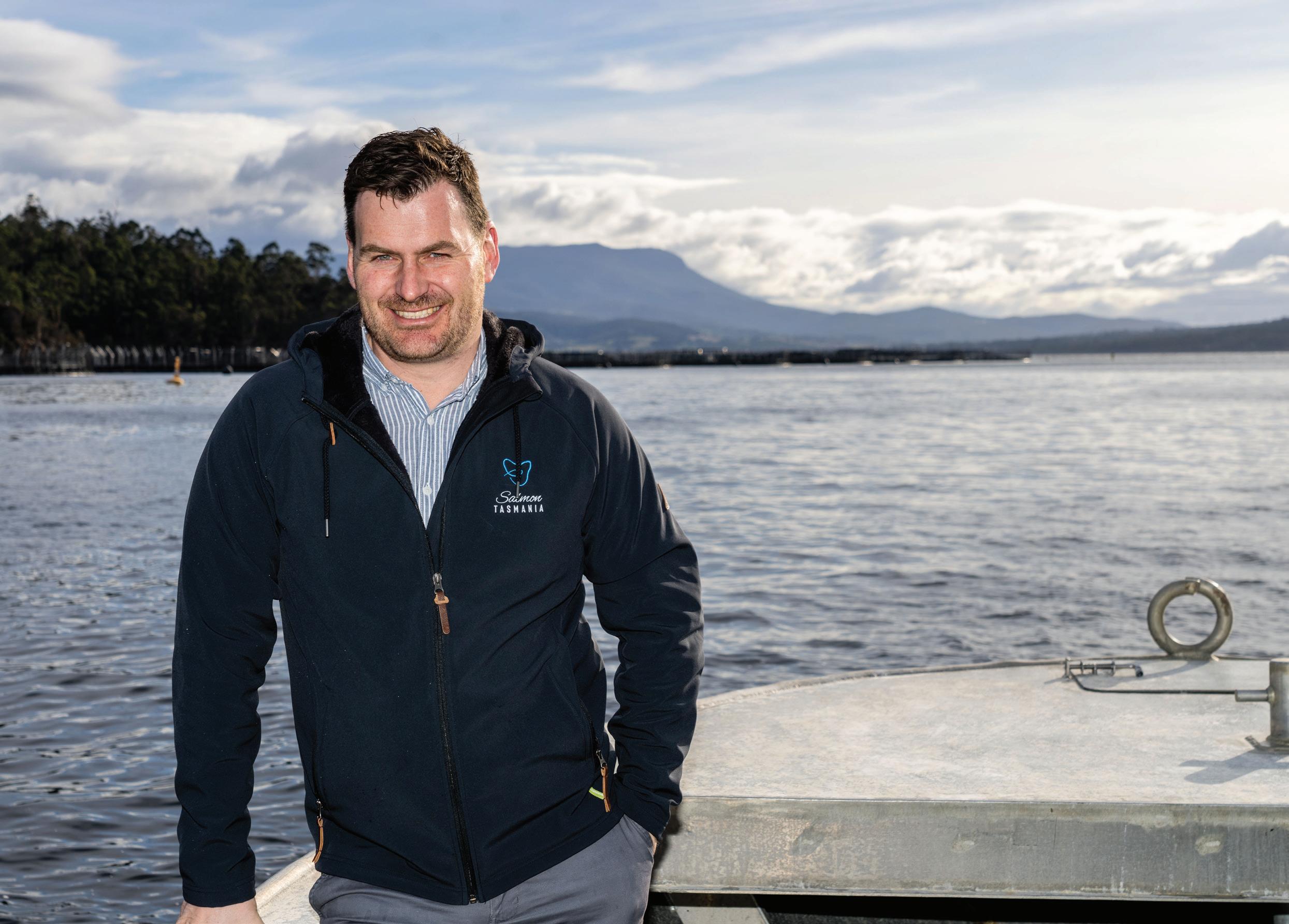
Page 8
“Tasmanian people are fiercely proud of their communities and the industries that keep them ticking along.”
Luke
CEO, Salmon Tasmania
of the salmon industry, and in local government areas like Latrobe, Tasman, and the West Coast, where 17% of the workforce are in jobs related to the salmon industry.
Nine out of ten of the jobs created by the salmon industry are in regional Tasmania, and pride for these communities comes in part from being able to obtain good, well-paid employment that allows them to stay in the place they call home.
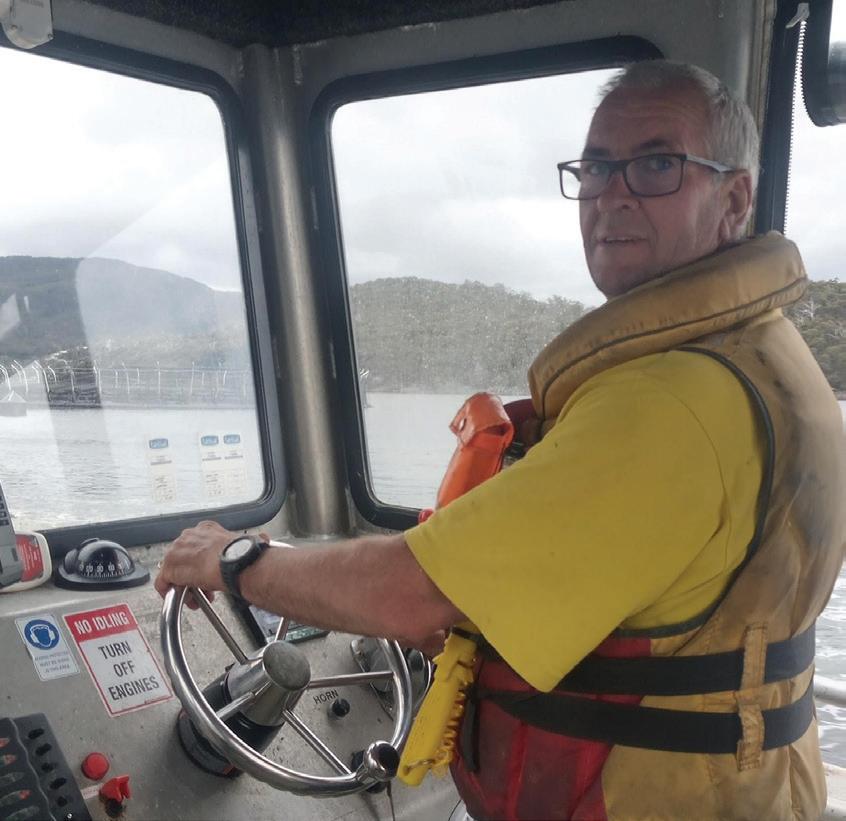
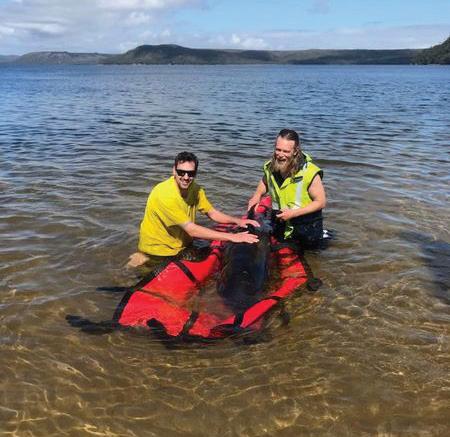
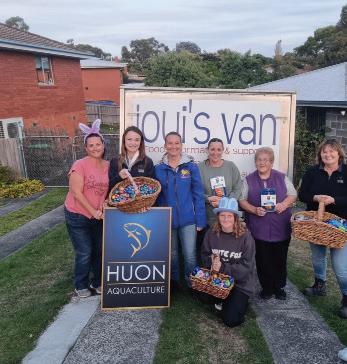
Our salmon industry is Tasmania’s largest primary producer, making up 86% of the state’s total seafood production and proudly holds the title of Australia’s most valuable seafood sector. All this from our reginal towns and communities such as Strahan, Dover, Margate, and Triabunna.
What makes these statistics even more staggering is that, as the state’s largest primary producer, being approximately double the size of the horticulture sector and 38% larger than the red meat processing industry, aquaculture has a very small footprint. In fact, the total lease area of finfish farms in Tasmania is 4,002 hectares, compared to plantation forestry at 309,900 hectares and agriculture at 1,890,000 hectares.
Tasmania’s salmon industry is dedicated to locking-in
Australia’s food security, producing a high quality, highly nutritious, sustainable protein without putting pressure on depleting wild fish stocks or natural resources.
opportunities pay up to 73.9% more than the average jobs in these regions.
With this comes opportunity as it sets up our young people so they can invest in the region, buy a house, start a family, and contribute to the social and economic wellbeing of their communities.
In terms of carbon emissions, ocean-based salmon farms emit less than half the emissions of land-based protein.
While these statistics and the industry’s efficiency is impressive, the reality on the ground is that our industry enables young people to start out their careers in our small regional towns. This was once only a dream for these communities and past generations watched on as their children were forced to move away from home to secure a good start in life.
Now, in part because of the salmon industry, we are seeing young divers, engineers, environmental scientists, and farm workers settling in these regional towns with the confidence that only highquality, well-paid employment can bring, because salmon industry employment
Investment is the key to developing regional communities and our industry invests around $8.5 million, or 55,000 hours into staff training per year. We have invested $681 million in research and development in the past ten years that benefited the broader scientific community and we invest locally, putting around $1.6 million into grants, donations, and community sponsorship every year.
Our innovative salmon industry is an integral part of these communities and is embedded into our regions, our people, our economy, and our future.
The benefit of this contribution is the lifeblood that allows our regions to thrive, and I encourage you to check out the report which is available at salmontasmania.au/vital.
As published in the Mercury Newspaper.
“In a post carbon world, salmon farming has one of the lowest carbon footprints of any livestock industry.”
Luke Martin is the CEO of Salmon Tasmania.
Celebrating Our Industry
Thank You
MORE than 1200 people attended a free event in the Huon Valley to thank the industry’s workers and suppliers and to recognise the importance of Tasmania’s salmon industry.
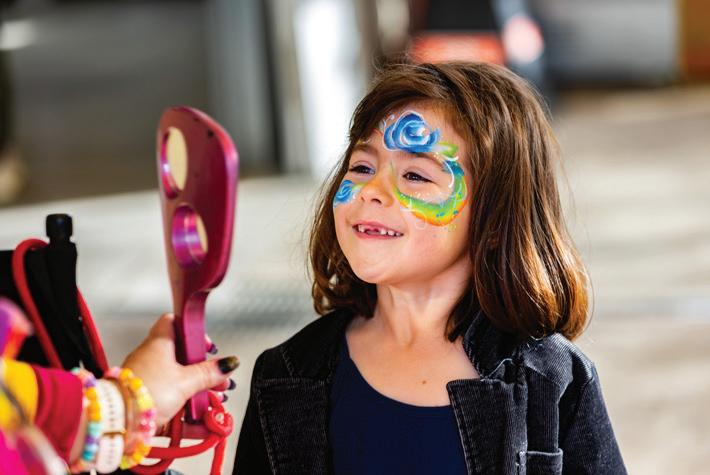
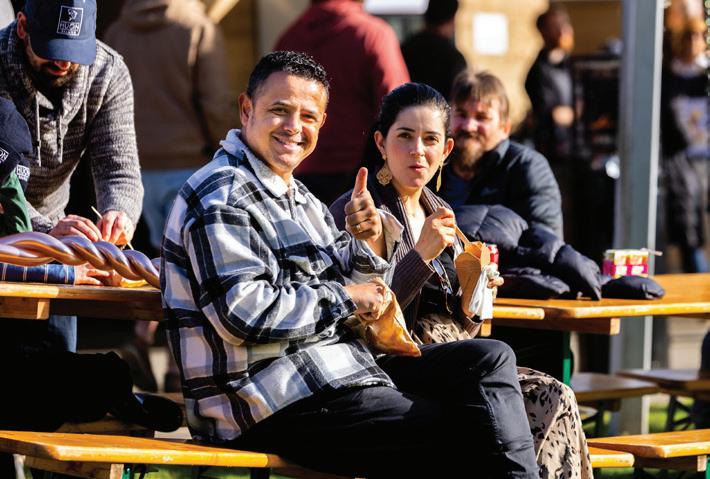
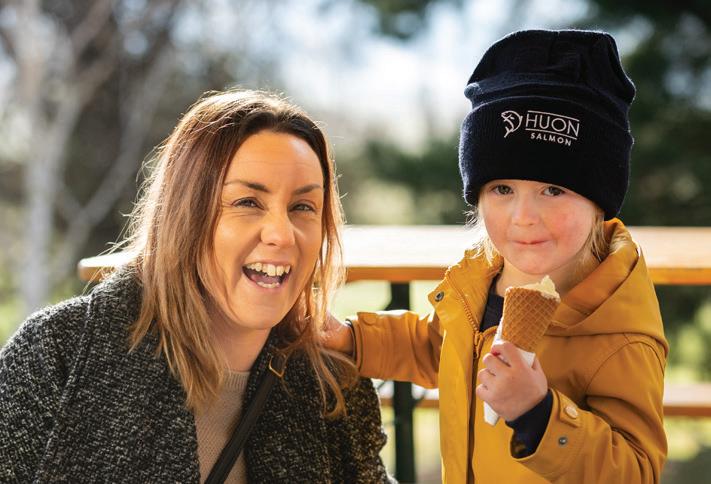

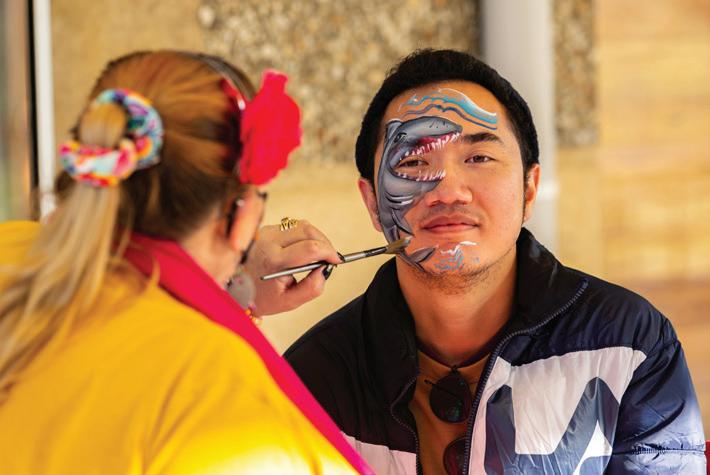
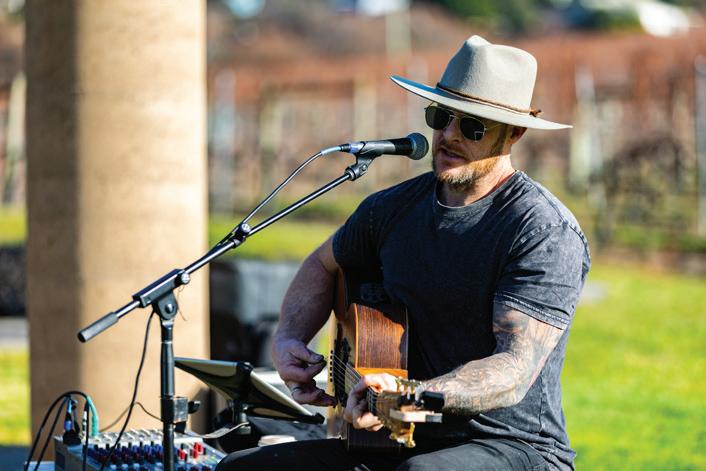
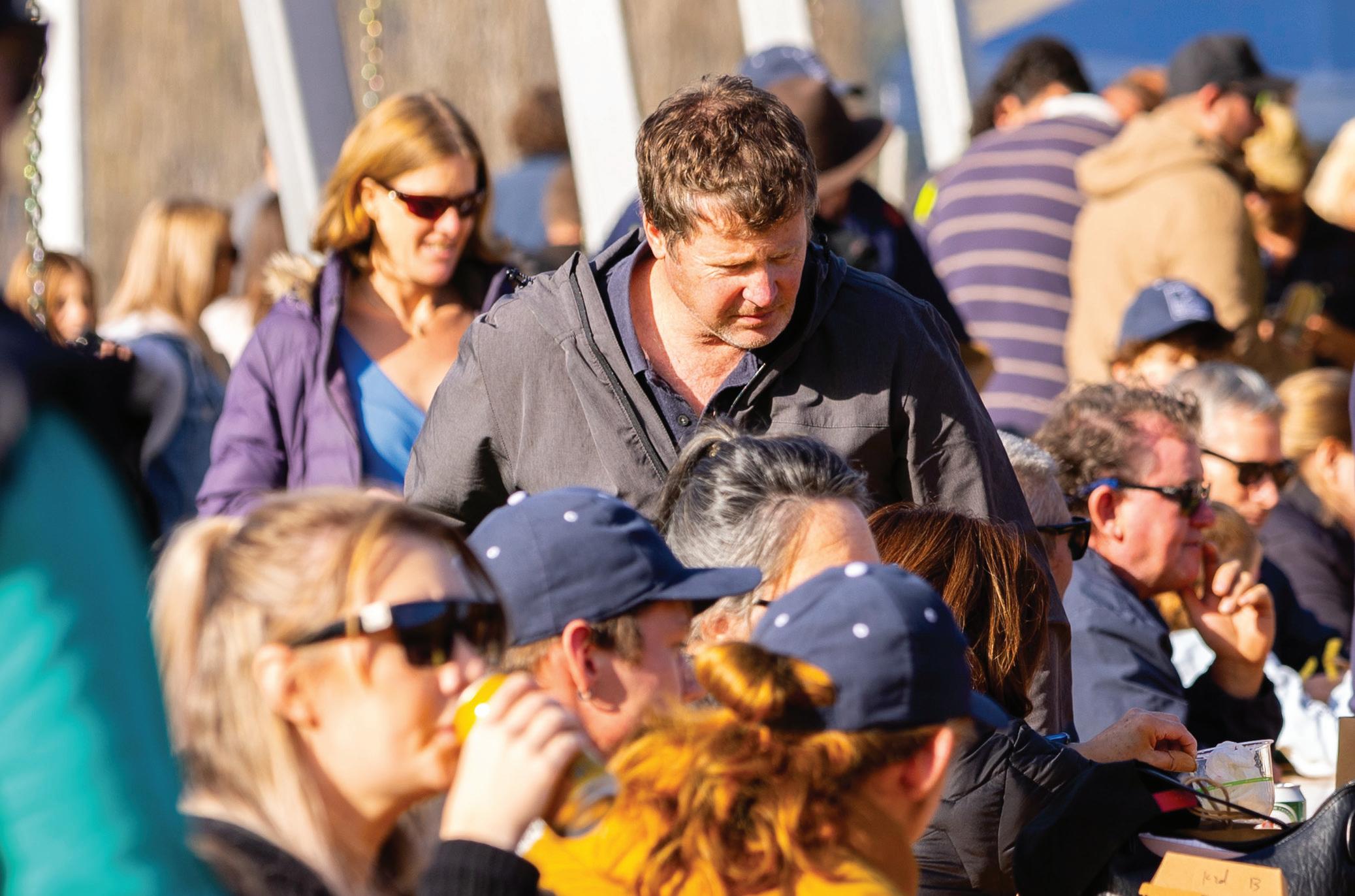
Page 10
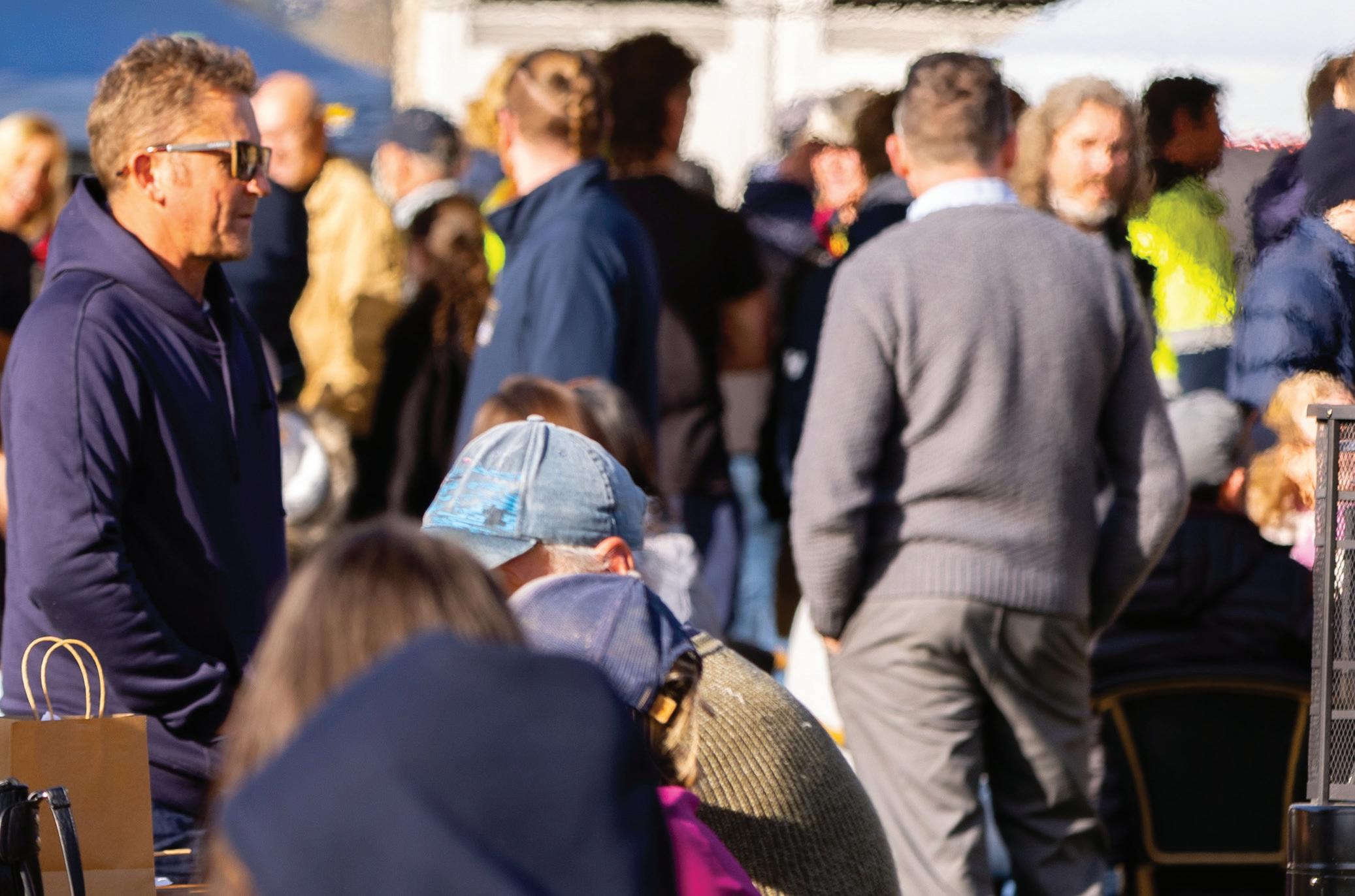
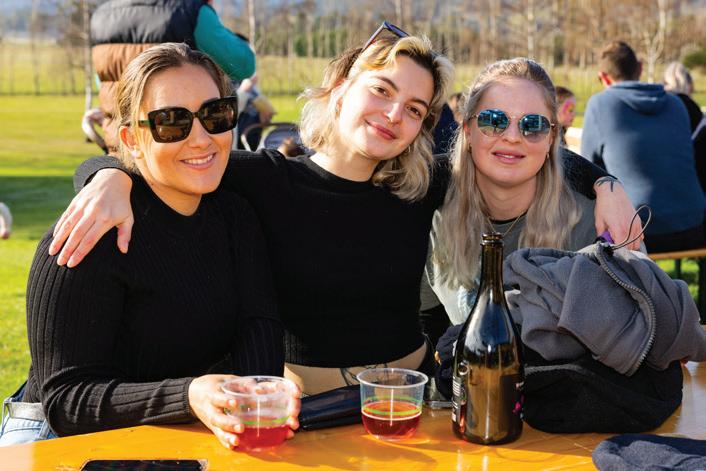
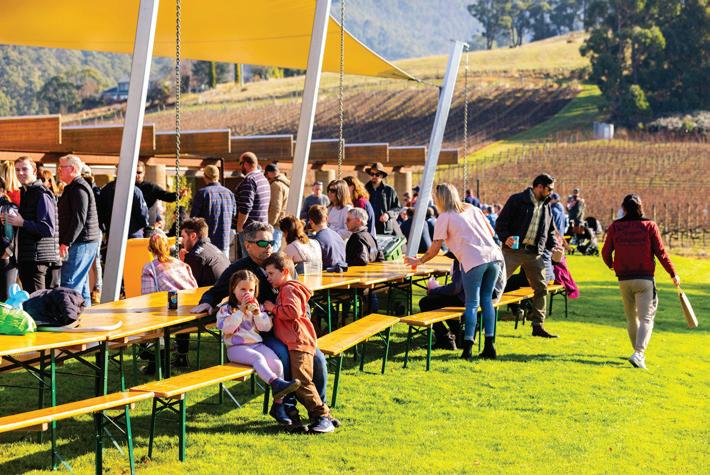
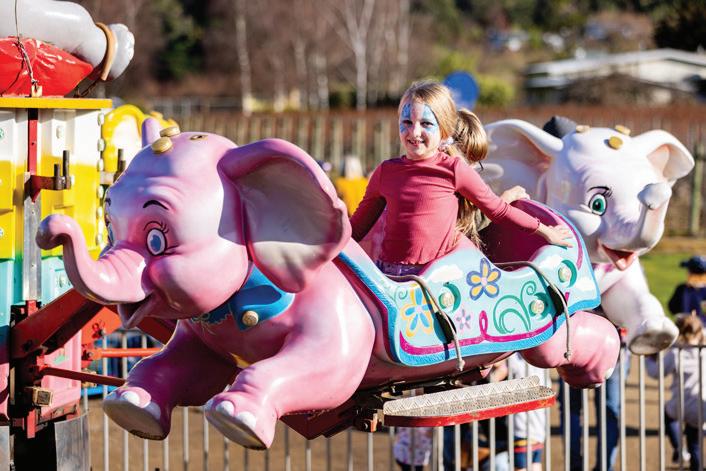
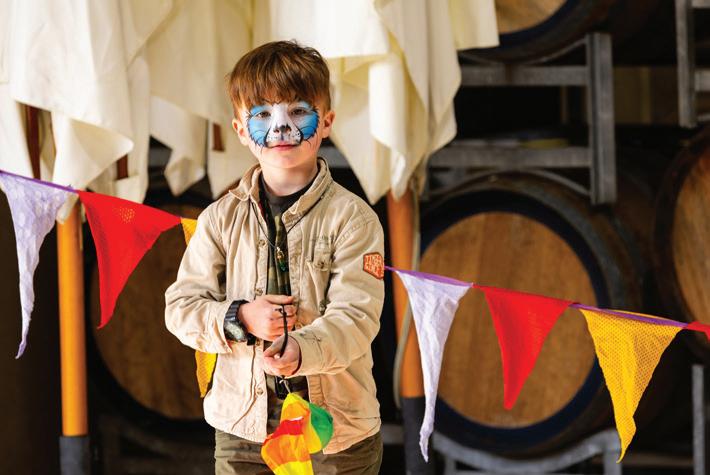
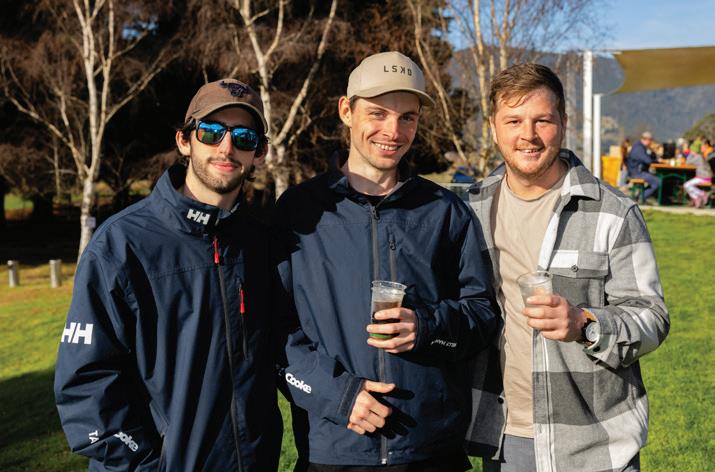
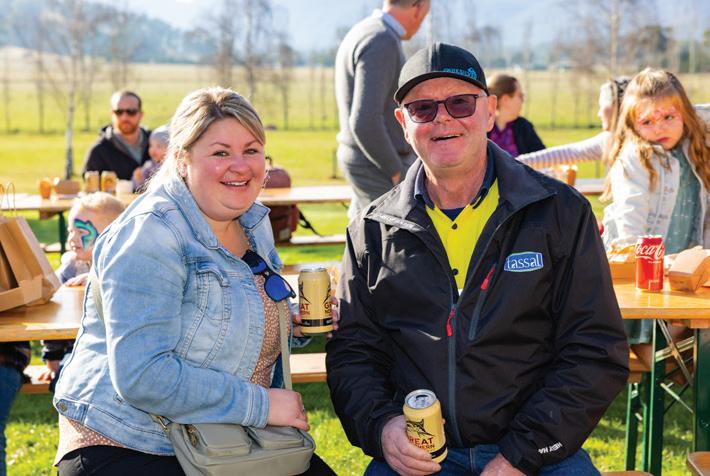
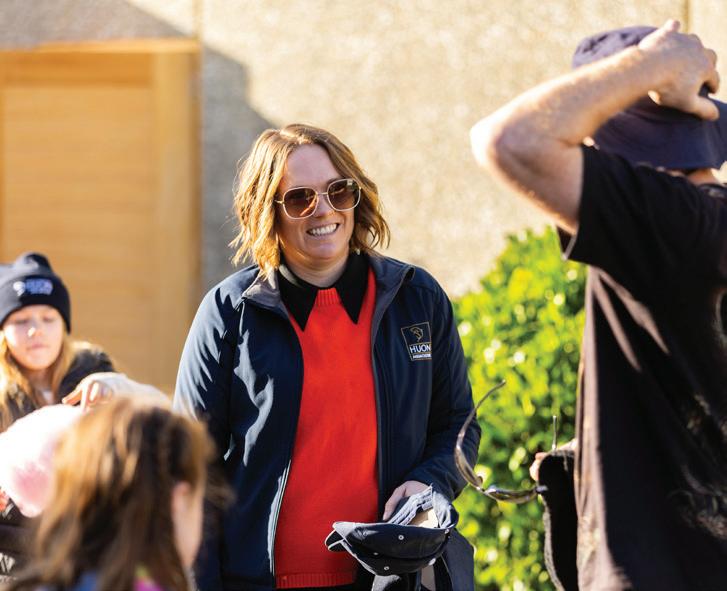
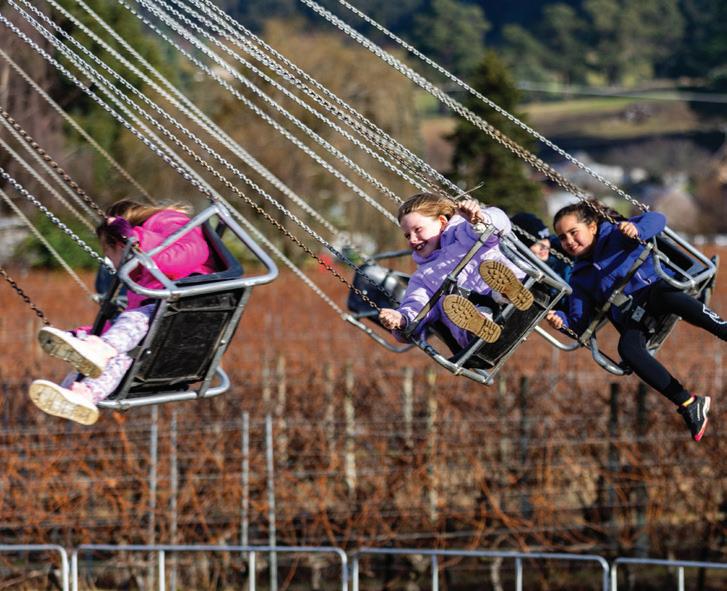
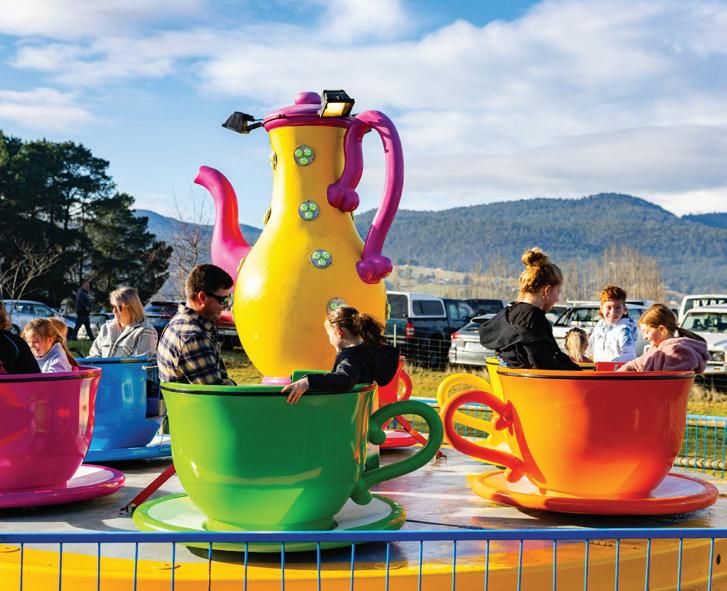
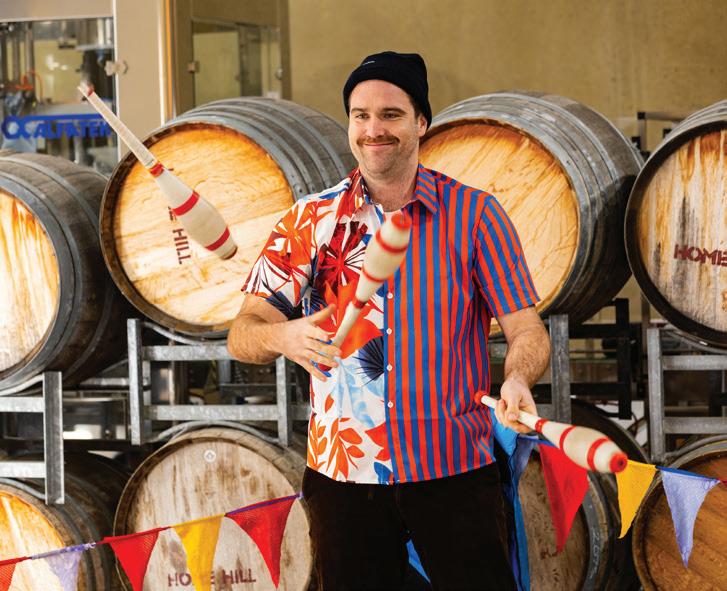
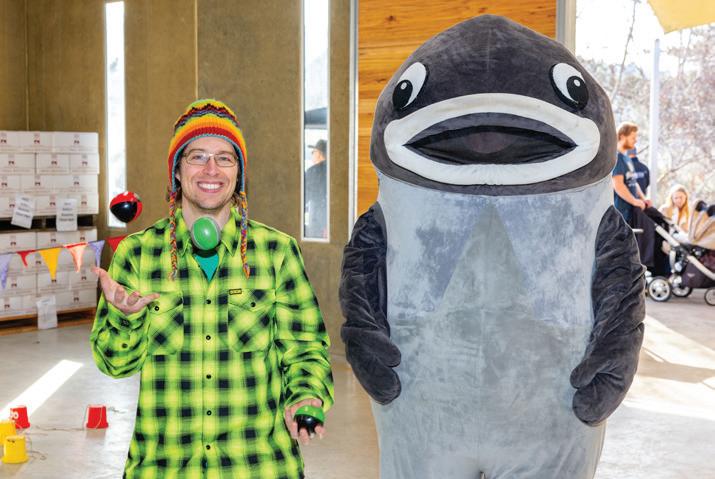

Page 11
Economic & Social Contribution Report
Tasmanian Salmon Industry’s Contribution to Jobs and the Economy
A recent report produced by Salmon Tasmania in collaboration with Deloitte has garnered widespread praise for highlighting the significant benefits of the $1.36billion industry to workers and the economy across the state.

The Economic and Social Contribution Report revealed that the industry contributed $770 million to the Tasmanian economy in the past year and supported over 5,103 full-time equivalent jobs statewide.
The analysis further revealed the salmon industry accounted for more than a quarter of the jobs in the Huon Valley and 17% of employment in the Latrobe, Tasman, and West Coast local government areas.
The report emphasised the industry’s positive impact on regional communities, with almost 90% of the economic activity occurring in these areas. Additionally, salmon workers in regional communities earned,
17% of all jobs are related
on average, 56% more than workers in other industries in the same areas.
Luke Martin, CEO of Salmon Tasmania, expressed pride in the industry’s contribution
in every
In the Huon Valley 1 4 jobs (26%) are related to the salmon industry

Page 12
In Latrobe, Tasman & West Coast
to the salmon industry
Total Gross Value Added by the salmon industry by LGA, Tasmania
L-R Tori Percival, Jo Palmer MLC, Luke Martin, Sean Riley, Depha Miedecke at the report launch
to regional communities and emphasised the stability and rewards it offers to its workforce.
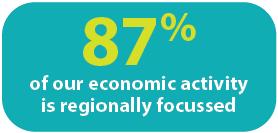
The Tasmanian salmon industry, valued at $1.36billion, was
found to be twice the size of the horticulture sector and 38% larger than the red meat processing industry in Tasmania.

The report also highlighted that 91.3% of workers in the industry were employed full time.
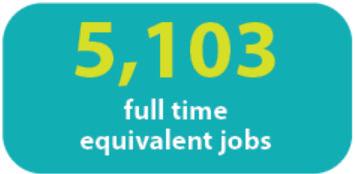


out of


The industry was commended for providing diverse employment opportunities across various stages of the value chain, including aquaculture, hatchery operations, processing, logistics, and marketing.
Minister for Primary Industries and Water, Jo Palmer, welcomed the report and praised the industry for its sustainable investments in Tasmania.
Huon Valley Mayor Sally Doyle acknowledged the report’s findings, which underscored the positive ripple effects of the industry on the local economy.
THE Tasmanian Salmon industry: a vital social and economic contributor


Page 13
Comparison of economic contribution of key Tasmanian industries
Source: Deloitte Access Economics, SG Heilbron Economic & Policy Consulting, Institute for Marine and Antarctic Sciences, Australian bureau of Agricultural and Research Economics and Sciences
9 10 of our workers are in regional Tasmania Scan or click QR code to read the report
Celebrating
Petuna opens $13m RAS Hatchery in cressy
Petuna Aquaculture has opened the doors to a new state-of-the-art RAS (Recirculation Aquaculture System) facility at its hatchery in Cressy, injecting $13 million into Tasmania’s aquaculture industry and removing the company’s reliance on flowthrough hatchery technology for its salmon stock.


Cressy III will enable Petuna to further improve its environmental and sustainability credentials, using world-leading technology to recirculate up to 99 per cent of the water its fish are living in, through mechanical and biological filters.
Petuna Acting Managing Director, Gary Neill, said the new hatchery system used less than five per cent of the water
of traditional systems and would allow the company to grow its salmon to a larger size on land, reducing the time they needed to be at sea.
“Cressy III is an integral project for Petuna, demonstrating our commitment to continual improvement in environmental
sustainability, with 100 per cent of the waste planned to be used on a neighbouring farm,” Mr Neill said.
“The development includes the construction of a third RAS facility at our Cressy hatchery, transitioning the site to full RAS and eliminating reliance
Page 14
Premier Jeremy Rockliff & Rene Contreras, GM Freshwater at the hatchery opening
Petuna Acting Managing Director, Gary Neill
on the traditional flow-through system, providing a controlled environment for our fish to thrive.
“The facility will give us greater ability to control the water quality and temperature in the tanks, including improved nutrient management, to create optimal conditions for our young fish as they grow and develop.

“We researched globally to identify the best methods of developing Cressy III, and we’re proud to open one of the most innovative new systems in Australia, as part of our sustainability strategy to invest in the world’s best technology.
“In conjunction with implementing this global technology, we are also very proud of the fact that 70 per cent of the total $13-million build was carried out by local Tasmanian companies.


“Our commitment to sustainability is exemplified by Petuna being the first company in the world to have two species accredited with Best Aquaculture Practice (BAP) Four Star as well as attaining the first BAP hatchery accreditation in the southern hemisphere”.

Page 15
CLICK HERE To Watch the video
Premier Jeremy Rockliff addresses the launch
Inside the new facility at Cressy
Tassal has completed its acquisition of MPA Fish Farms Pty Ltd and MPA Marketing Pty Ltd (“MPA”), which operate Australia’s only ocean-based barramundi farm at Cone Bay, Western Australia.

This secures the future of more than 50 local jobs in the Kimberley region.
As Australia’s largest vertically integrated seafood grower, processor, marketer and seller with nearly 2,000 people employed across Australia Tassal
Tassal acquires Australia’s only
welcomes a new group of faces to their growing team Australiawide. Tassal remains focused on its purpose of ‘Sustainably Feeding Tomorrow’ and are delighted to add barramundi to its ever-growing list of products.
Tassal believes in sustainably produced food, through responsibly harnessing the nation’s precious water resources and playing its part in ensuring a prosperous, healthy planet for future generations.
Tassal is now part of Cooke Inc., one of the largest global aquaculture and seafood family of companies, producing salmon, sea bass, shrimp/ prawns, and harvesting several wild fisheries species.
Cooke’s core purpose is to ‘cultivate the ocean with care, nourish the world, provide for our families, and build stronger communities.’
Tassal Managing Director and CEO Mark Ryan said he looked forward to adding Australian ocean-farmed
Page 16
Tassal’s new barramundi farm at Cone Bay, WA
ocean grown Barramundi farm
barramundi to the business. “Tassal has turned around both the salmon and prawn industries in Australia before and has the skills and capabilities to apply the same learnings and intellectual capital to do this for the MPA companies and the wider barramundi industry in Australia,” he said.
“We are excited to bring worldclass engineering, technology, innovative equipment, and 36 years' experience in aquaculture to operating this barramundi farm.”
Tassal will have a head-start by leveraging excellent existing relationships with retailers across Australia to reinforce the reputation of West Australian barramundi as a premium product.
MPA currently produces around 1,600 tonnes of barramundi annually in Australia.

“Once operations are consolidated, we will look at growth opportunities.
“This is a huge win for Northern WA, and a win for local jobs and investment.
“At Tassal we work in regional areas across the country and are committed to working closely with traditional owners and the local community,” Mr Ryan said.
Tassal branded barramundi is due to hit the market in November 2023 just in time for an Australian summer.

Page 17
Some of the Tassal team visiting Western Australia recently. L–R: Mark Asman, Tim Shepherd, Zack Wingfield, Daryn Payne & Simon Barrile
The team at Huon Aquaculture’s Ingleburn processing facility scored the highest possible result in a recent audit by Coles.
The ‘blue rating’ demonstrates Huon’s ongoing dedication to the safety and quality of its salmon products.
Ingleburn scores big blue tick from Coles
Huon Aquaculture Quality Assurance Manager (NSW) Jana Idrisoglu was incredibly proud of the result.
“The team at Ingleburn are audit-ready every day. Each one of us is responsible for food safety and quality, and
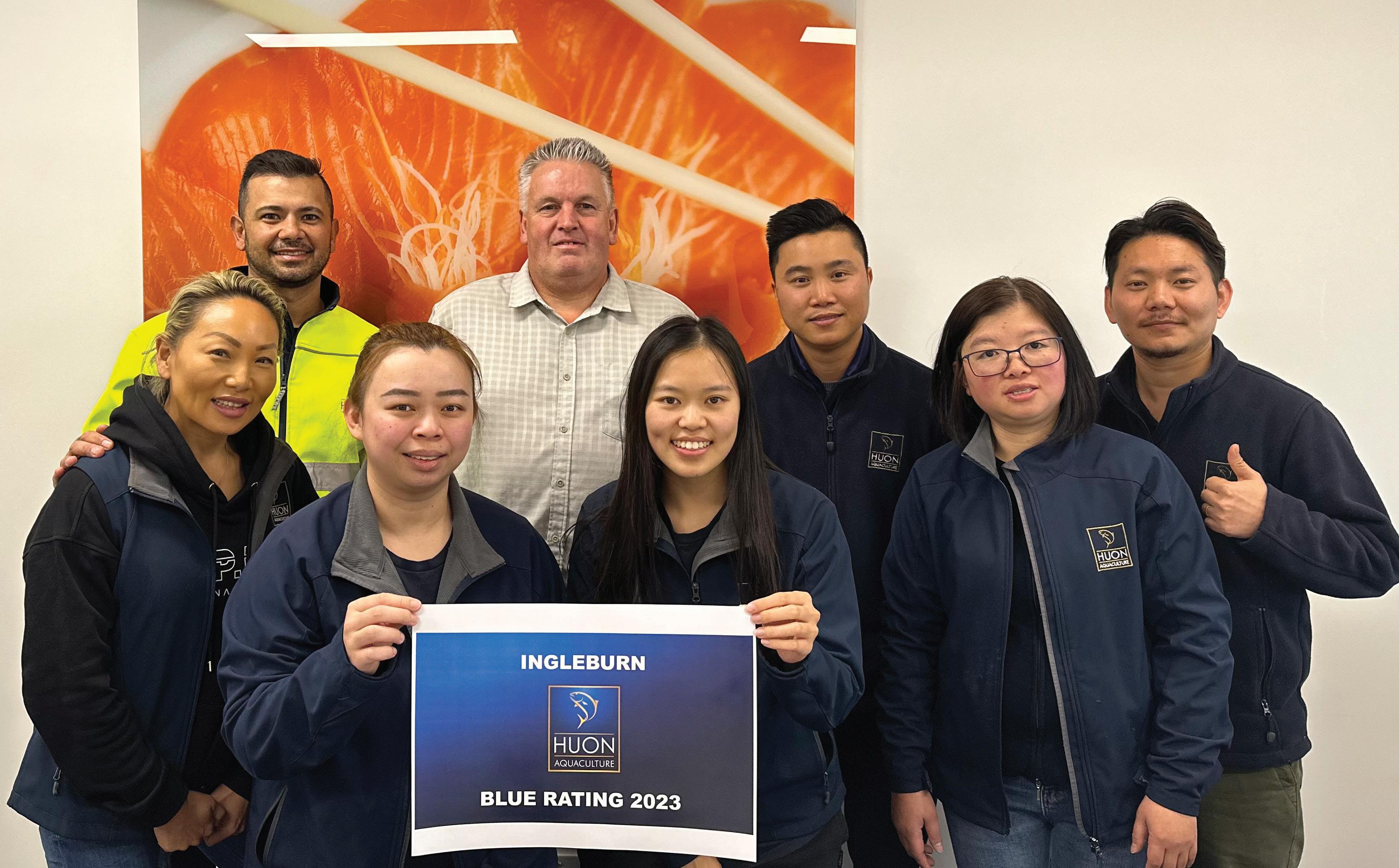
we take pride in what we do,” Jana said.
“We are a very close team and work together to improve every day.”
Congratulations team!
Huon on the road:
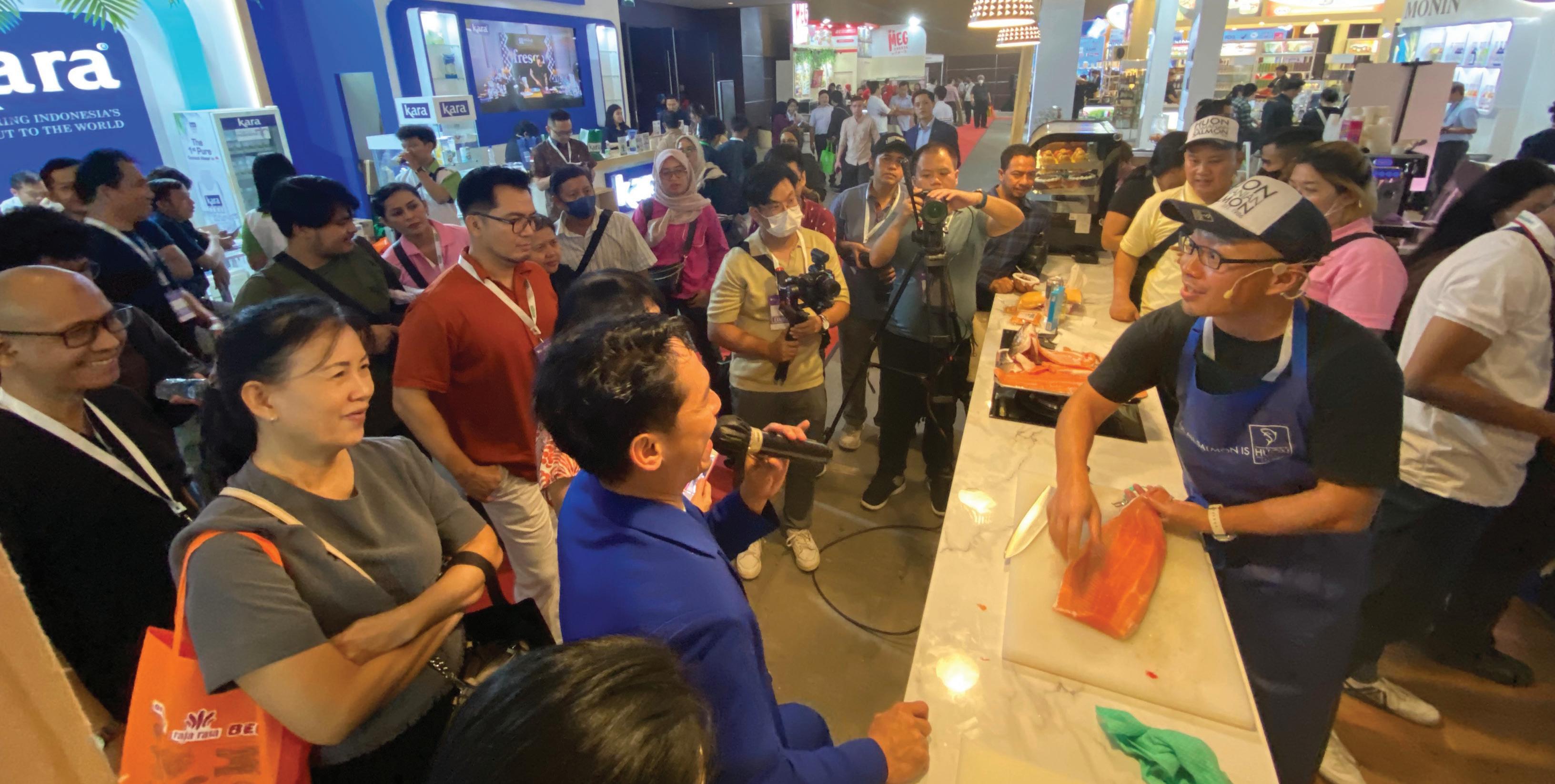
Page 18
The team at Huon’s Ingleburn facility
Rob Man showcasing Huon salmon in indonesia
Huon Shines at industry panel
A trio from Huon’s fish performance operations have flown up to Cairns to participate in the FRDC Aquatic Animal Health and Biosecurity Conference.
Group Fish Health Manager Jasmine Knowles, Fish Health Manager Rod Coughlan and Fish Performance Manger Mathew Gordon-Smith attended the week-long event.
Jasmine took part in the Industry Panel Session, joining female leaders in aquatic animal health across the major seafood industries, where she represented Salmon.


“It was such a fantastic week and we all learnt a lot about emerging challenges and the importance of collaborative research,” Knowles said.
The conference drew participants from across Australia, NZ, SE Asia and beyond, with keynote speakers from Norway, South Africa and Australia.
The Indonesian Trade Expo
Huon’s own globetrotter Rob Man is in Indonesia, showcasing the very best Huon has to offer.
This year Huon teamed up with one of their key distributors Pt Masuya for a booth at Food and Hotel Indonesia, held in Jakarta 25-28 July.
Huon was on show at the grand tasting table of their booth, with sushi demonstrations daily. It’s a great chance to showcase Huon, catch up with many of our key customers and continue building relationships for such an important market.
Huon has been trading with Indonesia for many years – and with it’s close proximity to Australia and large population, it’s a key market for Australia’s trade now and will be increasingly important in years to come.

Page 19
Dr Jasmine Knowles
Tassal clean up AT stewardship awards
SUSTAINABLE SEAFOOD AWARDS
AUSTRALIA 2023
For the second year running Tassal has taken out two awards at the Aquaculture Stewardship Council (ASC) and Marine Stewardship Council (MSC) Sustainable Seafood Awards.
The awards recognise organisations and individuals who make significant contributions towards responsible aquaculture and sustainable fishing practices.
Huge congratulations to Jody Mulholland from Proserpine, QLD who was awarded the ASC Young Person in Aquaculture Award for her work in enhancing sustainability management across their prawn farms.

Jody has been instrumental in enhancing Tassal’s sustainability management culture at our Proserpine Farm and helped in
SUSTAINABLE SEAFOOD AWARDS
AUSTRALIA 2023
promoting sustainable aquaculture within the local community.
We are also pleased to confirm that Tassal was highly commended in the ASC Above and Beyond Award category for its work in reducing emissions from its ASC-certified salmon farms in south-eastern Tasmania, including the implementation of electric compressors and shore-based power.



Gold for Huon at Fine Food Awards
A strong showing from Huon Aquaculture has secured the company four medals in the Seafood, Smallgoods & Delicatessen section of the 2023 Royal Tasmanian Fine Food Awards.
The seafood section has over 20 classes including edible seaweeds, fresh fish, mussels and oysters, smoked trout and salmon, caviar, scallops, squid, calamari and pates.
Huon submitted four exhibits this year and scored medals for all of them. Their Fresh Atlantic Salmon Hog awarded a gold medal with a score of

96, judges noting it had the best colour in show.
Huon’s Salmon Caviar also caught the eye of judges, taking home gold and a score of 96.
The company’s Wood Roasted Salmon scored 82 and a silver medal, as did the Wood Roasted Blackened Spice Salmon with a score of 87.
A very big congratulations to everyone involved in the process of growing and processing Huon’s fish and thank you to everyone involved in organising the exhibits.
Page 20
JODY MULHOLLAND ENVIRONMENTAL PARTNER – PRAWNS
WINNER YOUNG PERSON IN AQUACULTURE
#FISHFOREVER #SUPERSEAFOOD
2023
HIGHLY COMMENDED ABOVE AND BEYOND AWARD
Prestigious Recognition for Petuna
Petuna has received prestigious recognition by securing the Champion Seafood award in the Seafood, Smallgoods, and Delicatessen category at the Royal Tasmanian Fine Food Awards.
Out of the numerous contenders, Petuna stood out as one of the two Tasmanian participants to seize this esteemed accolade.
Petuna proudly labels its ocean trout as the “wagyu of the sea” and boasts an annual production of 500 tonnes of this exquisite fish variety.

Luke Freeman, Petuna’s National Account Manager, said after being named the reserve champion in the previous year, Petuna has now surpassed expectations and achieved an even greater achievement in 2023.
“From our processing facility located in East Devonport, our ocean trout reaches toptier restaurants throughout Australia”.
“Moreover, our ocean trout finds its way to international destinations such as Los Angeles and various locations across the United States, as well as Southeast Asia, through our exports,” he said.
Collaborating for a sustainable future

Huon Aquaculture recently took part in the Blue Economy CRC.
The event brought together more than 40 organisations from around the world to collaborate on research, lead new thinking and have practical impact on the growth of our sustainable blue economy.

The 2023 BE CRC participant workshop was held in Perth recently, and supported by Huon team members Leigh Savage, Adam Smark, Anthony Pearce and Matthew Whittle.
During the workshop the team participated in project meetings and panel discussions which covered the importance
of aquaculture in the blue economy and its contribution to the world’s food security. It also touched on the need for targeted research and development to support future aquaculture growth; and the decarbonisation of the aquaculture industry through access to clean and reliable renewable energy.
Page 21
Matt Whittle representing Huon in Perth WA
Tassal reducing relience on diesel power
Four Tassal salmon farming leases previously powered by diesel generators are now running on shore power.

These leases have had power supply connected from the shore to each feed barge using submersible cable. The shore power project has reduced Tassal’s dependence on fossil fuels, moving from non-renewable energy to a renewable energy source.
This has reduced diesel consumption significantly, and therefore the company’s carbon footprint, while also reducing the noise emissions from each of its leases.
Tassal is currently assessing other sites for their suitability to convert to on-shore power.
Sixteen diesel compressors have also been removed from feed barges on Tassal leases and replaced with electric compressors.
Recycled Tree Guards Saving Native Gums
will revegetate this property with 2,000 E. ovata seedlings in Spring later this year.
“Our focus is Eucalyptus ovata (black gum) forest and woodland communities. Not only is this forest type listed as threatened in its own right at the state and Commonwealth level, but it also represents critical habitat for the swift parrot and forty-spotted pardalote in Tasmania.” BGCG President Isaac Standaloft said.
Thousands of recycled tree guards from Huon’s Sassafras processing plant have been given a new lease on life.
The guards were donated to Black Gum Conservation Group (BGCG), a volunteer led non-profit, under parent organisation Wildcare Tasmania.
The group focuses on habitat as part of its conservation efforts with the recycled tree guards to be used on a revegetation project in Parkham, just down the road from the Paramatta Creek Processing Facility. This property holds established Eucalyptus ovata (black gum) with swift parrot records nearby. BGCG
With the Black Gum Conservation Group focused solely on tree planting, their efforts are supported by fundraising, education, weed management, and habitat management. The group establishes new areas of Black Gum, largely through on-theground revegetation projects on public and private land.

Page 22
Petuna leads the way in sustainable packaging
Petuna is set to revolutionise its packaging practices with a groundbreaking sustainable solution.
The company’s Gold Awardwinning Ocean Trout and Atlantic Salmon is now being transported in innovative cardboard boxes, marking a significant stride for the industry and the environment.
This eco-friendly packaging initiative is projected to divert more than 150,000 poly boxes from landfill annually in this Australian-first development.
The new packaging is crafted from locally sourced, sustainably derived paper-based materials, manufactured and supported within Tasmania.
Once fully implemented, the cardboard boxes will substantially reduce Petuna’s contribution to landfill and slash CO2 emissions resulting from truck movements by an impressive 90%.
Petuna’s commitment to delivering the highest quality, sustainably sourced salmon and trout extends beyond the products themselves.
This dedication to sustainability is an essential requirement of Petuna’s globally recognised Best Aquaculture Practices (BAP) Four Star Certification, ensuring adherence to the highest standards at every stage of the production chain, from hatcheries and marine farms to feed mills and processing plants.
Opal, a prominent fiber packaging company operating in Australia and New Zealand,
collaborated closely with Petuna to create this groundbreaking alternative to expanded polystyrene (EPS) packaging for whole fish transportation.
EPS, due to its non-recyclable nature, commonly ends up in landfills, posing a significant environmental challenge. Opal’s solution, comprising more than 55% recycled paper, has been rigorously assessed through the Packaging Recyclability Evaluation Portal (PREP). It is not only recyclable in Australia and New Zealand but is also widely accepted through council kerbside recycling collections.
Opal Fibre Packaging emphasised the innovative design of the corrugated box, featuring moisture barrier properties that withstand low temperatures for fresh chilled products.

The packaging is approved for airline transportation for export purposes and is suitable for domestic controlled cold chain transportation.
Utilising Opal’s patented process and functionally coated liners, the packaging solution produced for Petuna achieves stunning photographic quality branding.
Over the next six months, the new sustainable packaging will be gradually introduced, representing a significant step forward in the Australian salmon industry’s commitment to environmental responsibility.
Petuna’s partnership with Opal has demonstrated that sustainable packaging alternatives can be both practical and visually appealing, while significantly reducing the industry’s ecological footprint.
Page 23
Showcasing Our Science
Scientists present extensive research on Storm Bay salmon farming.
Storm Bay, a vibrant marine ecosystem that is often battered by challenging conditions, has become the focal point of a contentious debate surrounding the expansion of salmon farming. However, scientists assert that any decisions regarding the expansion will be based on comprehensive research conducted over several years.
Located south of Hobart and east of Bruny Island, Storm Bay is characterised by its teeming marine life and frequently treacherous environment.
Experts from the CSIRO (Commonwealth Scientific and Industrial Research Organisation) and the Institute for Marine and Antarctic Studies (IMAS) emphasise that scientific findings will play a central role in determining the way forward.

Scott Condie, a senior research scientist at CSIRO, has dedicated the past few years to studying Storm Bay and developing weather prediction models for the marine ecosystem. Speaking at a science open day in Hobart, Condie explained, “We can employ these models to address questions such as the potential impact of increasing aquaculture pens in the area”. He further noted that Storm Bay was currently in excellent condition, owing to its vast size, openness, and energetic nature.
Condie acknowledged that additional salmon farming would introduce more nutrients into the water, but the key concern was assessing the bay’s capacity to withstand this additional pressure. He stated, “This is precisely why we are conducting the study— to determine the exact trade-offs involved. Our objective is to ensure that we can sustainably produce food while preserving the integrity of ecosystems like Storm Bay.”
Jeff Ross, an associate professor at IMAS, explained that scientists were actively engaged in studying Storm Bay by conducting dives, collecting water samples, examining plankton, and deploying submersible robots to explore its depths. The diversity of life found in the water and sediment serves as a crucial indicator of the bay’s overall health.
Ross emphasised the importance of not rushing the scientific process before proceeding with salmon farm expansion. He also expressed the scientists’ commitment to presenting objective information to the public, without attempting to sway opinion in favor of or against the industry. “Our primary aim is to provide access to the science, the very science utilised by decision-makers. This way, individuals can make their own informed opinions,” Ross affirmed.
The scientific community remains steadfast in ensuring that any decisions are guided by rigorous research and consideration of the bay’s delicate ecosystem.






Page 25 Click here to watch the video Click here to listen to the interview
Crowds gather at the science open day in Hobart
Showcasing Science
The Fisheries Research and Development Corporation (FRDC) released an independently reviewed report presenting a modelling and information system for water quality conditions in Tasmania’s Storm Bay in May.
The research undertaken by CSIRO, Australia’s national science agency, with funding from FRDC, developed a new coastal water quality model, to assist informed decisionmaking based on accurate and timely information.
The model presented in the Storm Bay Modelling and Information System report, simulates the seawater circulation and nutrient dynamics of the Storm Bay area, including inputs from rivers, wastewater and salmon farm nutrients and interactions with offshore ocean water.


The modelling system was developed using a ‘digital twin’ approach i.e., a virtual model of a physical object or in this instance, the coastal waters off southeast Tasmania.

The model predicts the observed circulation and water quality in coastal waters over multiple years and can be used to explore future scenarios with various levels of salmon farming.
For more information, visit stormbaymodelling.csiro.au/ csiro.au/en/news/all/ articles/2023/may/storm-baymodelling
Page 26
Scientists used ocean gliders to collect data, including temperature, salinity and nutrient levels in Storm Bay. Photo - CSIRO
Great to see the teams from Huon Aquaculture, Tassal & Petuna scouring the foreshores for Clean Up Australia Day.

These clean ups are a regular part of our industry and are
continually conducted in all regions where we share the waterways.
We had more than 50 people out and about, committing around 150 hours to pick up 6 cubic metres of rubbish.
Clean Up Australia Day
Of this, 70% was general and 30% was aquaculture and other fisheries (oyster, abalone, recreational, crayfishing etc.).
Great effort team!
Ronald McDonald House Partnership
Tassal recently invited industry colleagues to join them at Ronald McDonald House as sponsors of the Hobart kitchen where their team assists this worthwhile charity by cooking meals there once a month.

Ronald McDonald House Charities (RMHC) is there for families when they need it most: right in their own communities.
When a child is diagnosed with a serious illness, it impacts the whole family.
Lives can be turned upside down and families often have to travel far from home to
receive the medical care their child needs. RMHC’s eighteen houses, including the Hobart
House, provide essential care and support for families, only steps away from the hospital.
Page 27
L-R Hannah Gray, Maddie Parsons, Luke Cordwell, Tracey Martin and Depha Miedecke
our people
Freeman National Account Manager
Petuna/Sealord - 20 years and 4 months
Role and what I like most about it:
A great team of people from the farm, processing & sales Teams. There is always success, challenges and changes & no day/week/year seems to be the same which keeps the work environment exciting.
Seeing the company & industry grow over the years and how the technology evolves has been interesting as well. There is always great collaboration and continuous improvement.
Career history:
I completed my commercial cookery cert III (Chef) after leaving grade 10 at high school and worked travelling on island resorts throughout Queensland.
I then returned to Tasmania and started working with Petuna, taking local wholesale orders and doing deliveries in the Petuna van to restaurants across
Launceston and the Northwest Coast.
Since then, I have had multiple different roles in the company. QA Coordinator, Harvest/Demand Planner, Sales Coordinator, Business Development Manager, Supply Chain & now current role as National Account Manager. I feel extremely lucky to have had great mentors along the way.
Hobbies: Sport and adventures with family, and going to the family shack on Tassie’s east coast, fishing, recreational diving, old cars, side-by-side vehicles, boating, travel, food and wine experiences.

Favourite band: Linkin Park and anything country for easy listening.
Favourite movie: The Rock
Role and what I like most about it:
I am currently working as a Compliance Coordinator in the Southern Zone – Dover.
My favourite part of the job is the people I work with. There is a positive and resilient culture towards safety which creates happy people.
I also really enjoy the place I work. I get to see beautiful sunrises over the water every day. Not one day is the same and challenges keep coming which allows development and continued interest in this ever-evolving industry.
Career history:
I started my aquaculture journey in QLD, where I completed my degree in Marine Biology at JCU.
My first job in AQ was in a prawn farm in Ayr, Queensland as a Water Quality Technician.

Page 28
Luke
Joana Ferreira Compliance Tassal / Cooke
Cooke – 5 years
I then moved on to working on a barramundi nursery and when I was done with the heat I moved to Tasmania to start a job with Tassal as a Fish Health Technician.
Over the past three years I have been working in WHS compliance.
I am currently doing a Nuffield Scholarship which has fast tracked my professional development immensely. I am researching how other countries address and improve their social and environmental issues.
Hobbies:
Hiking, camping and exploring the hidden gems of the world with friends.
Favourite band: Hollow Coves, City of the Sun.
Favourite movie: The Untouchables
Huon Aquaculture/JBS - 9 years
Role and what I like most about it:
While I love the variety and challenge of marine operations, the people that I get to work with in marine operations are probably what I love most of all.
Huon Aquaculture provides the opportunity to learn new skills and develop professionally.
I never thought I would end up working in Aquaculture but it’s been a great career choice. I am just about to leave on a two month research fellowship to look at seaweed farming in Northern Europe and the USA.
Career history:
I came to Huon Aquaculture as a diver and then worked on the ROV crew. Previously I was at Flinders University studying and teaching. I also worked as a diver at Marine Produce Australia’s Barramundi Farm.

I started with Huon as a diver and then applied to work in the
new Marine Operations ROV team. I started work with a Saab Seaeye Falcon ROV in a crate and a 10ft shipping container strapped to the deck. We had two boats, one from Diveworks with Kelsey Treloar and the other was Huon (me).
We spent the time inspecting nets and grids and developing reporting processes. From that we built it up to more crews, more ROVs and better boats. It was great to be involved in setting this part of the company up. It gave me the opportunity to work with some great people both at Huon and at other companies that supply equipment to us.

Hobbies:
Bushwalking with my family.
Favourite band: Too many to list – Alexisonfire (my daughter is named after them).
Favourite movie: Night at the Roxbury
Page 29
Ferreira Mendes Coordinator
Dr Shea Cameron
Subsea Development Manager
our Recipes
SMOKED SALMON AND POACHED EGGS ON TOAST
Cooks in 10 mins
Easy Serves 2
METHOD
STEP 1
Brush slices of bread with olive oil on both sides and grill in a hot non-stick frying pan or grill plate for approximately 2 mins each side or until bread is nicely browned and toasted.
STEP 2
To serve, place 1 slices of grilled bread on each plate and top each slice with a spoonful of smashed avocado. Add 2-3 slices of Tassal Smoked Tassie Salmon on top and finish with a poached egg.

STEP 3
Sprinkle each with a teaspoon of dukkah and garnish with micro herbs and a few baby lettuce leaves. Serve hot with extra dukkah on the side and enjoy!
INGREDIENTS:
150g Smoked Tassie Salmon
2 slices sourdough, Pane Di Casa or Ciabatta loaf bread, thick cut
1 Tbsp olive oil
1 avocado, peeled, stoned & lightly crushed with a fork Lemon juice, squeeze black pepper & salt, pinch
2 eggs, soft poached
2 tsp Lemon & Herb Dukkah (optional) micro herbs & baby lettuce leaves to garnish (optional)
LEMON AND PARSLEY CRUMBED SALMON
METHOD
STEP 1
Preheat oven to 200°C fan forced with oven tray for 10 minutes. Preheating the tray helps to achieve an easy, crispy, golden crumb without the hassle of pan frying.
STEP 2
Combine ingredients to create lemon and parsley crumb.
STEP 3
Dip salmon into flour, egg wash (shake off excess egg wash) then coat in crumb. Place on baking paper and transfer carefully to preheated tray. Sprinkle top of fish with any extra crumbs. Spray liberally with olive oil spray and bake for 15 minutes or until salmon is cooked.
STEP 4
While fish is baking, combine tomatoes and basil. Mix pesto and olive oil together to create a pesto drizzle.
STEP 5
Serve crumbed fish on a bed of tomato and basil with a drizzle with pesto oil. Enjoy with new potatoes.
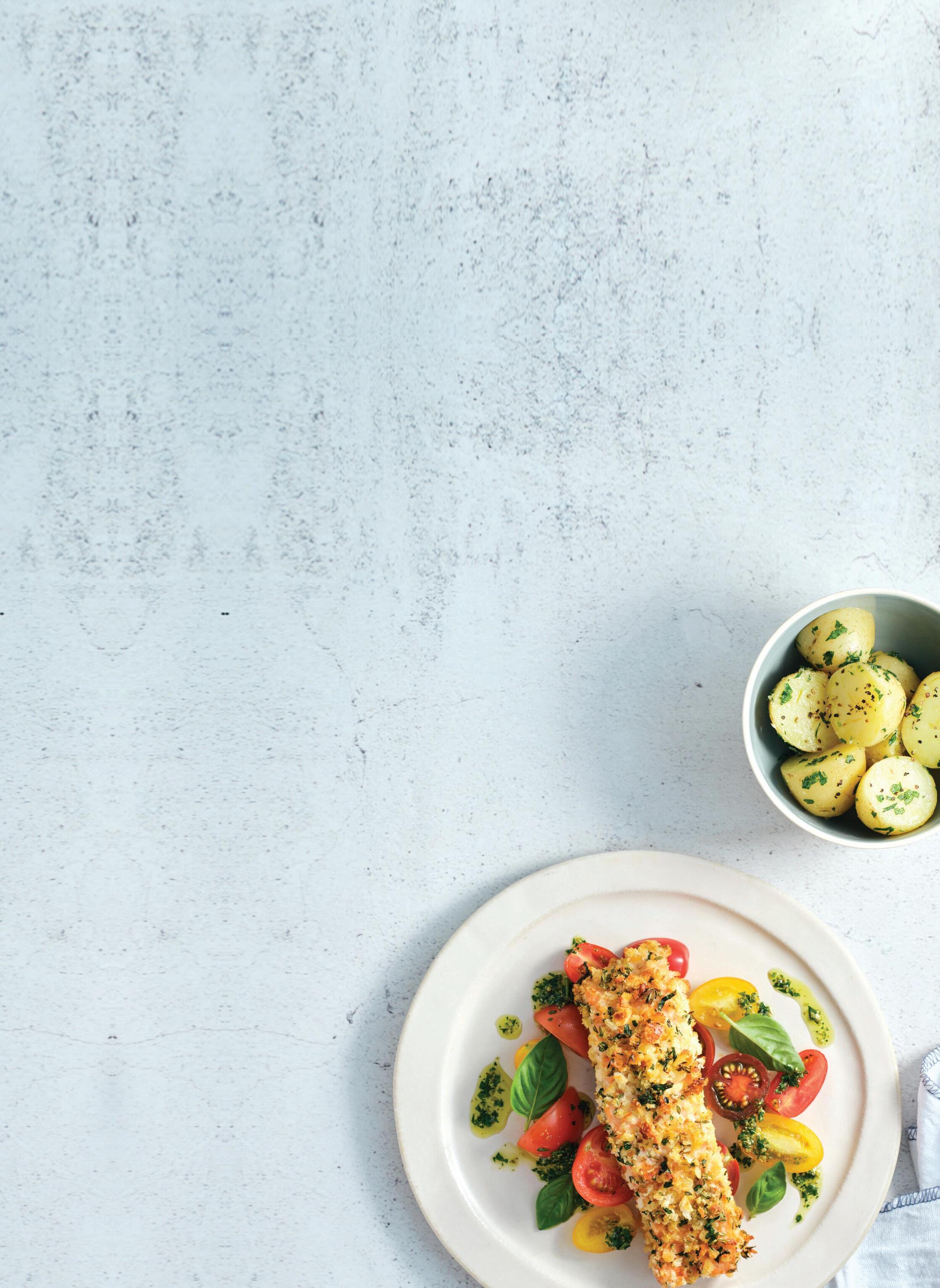
INGREDIENTS:
Crumb
1/2 cup coarse fresh breadcrumbs rind of 1/2 lemon
1 tablespoon finely chopped parsley
1/4 teaspoon dried chili , optional
20g butter , melted
2 tablespoons flour
Cooks in 25 mins
Serves
1 small egg, whisked with 1 tablespoon water
300g (2 portions) Fresh Tassie Salmon, skin off
Olive oil, spray
1/2 punnet cherry tomatoes, chopped
1/2 cup fresh basil leaves
1 teaspoon prepared pesto
1 tablespoon olive oil
Easy
Steamed new potatoes, tossed in herbs, to serve 2
Page 32 83 Salamanca Place, Battery Point, Tas. 7005 admin@salmontas.au salmontasmania.au



 Whale Rescue, Strahan - Daniel Costello
Rowella - Matt Stackhouse
Rowella - Greg McEvoy
Whale Rescue, Strahan - Daniel Costello
Rowella - Matt Stackhouse
Rowella - Greg McEvoy





























































































